On 16 April 2024, Congress President Marc Cools met Deputy Prime Minister and Foreign Minister of the Republic of Moldova Mihail Popșoi. Discussions focused on the decentralisation process in the country in the light of the Congress monitoring recommendations for improved application of the European Charter of Local Self-Government and the roadmap for their implementation, in the framework of post-monitoring dialogue between the Congress and Moldovan authorities. On this occasion, the President invited the Republic of Moldova to ratify the Additional Protocol to the Charter, on citizen participation in local public affairs. Reference was also made to the current co-operation activities aimed at accompanying the decentralisation reforms and improving the mechanism of consultations between central and local authorities.
News of the Congress of Local and Regional Authorities
Congress President meets Deputy Prime Minister of the Republic of Moldova
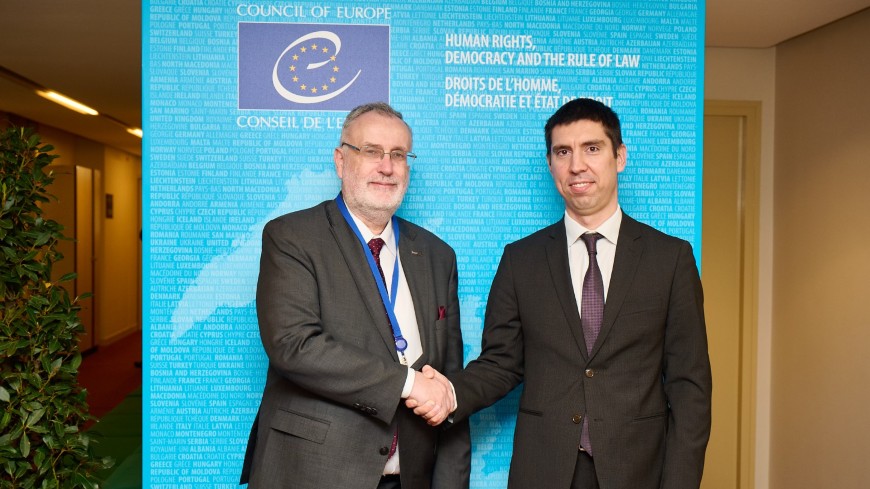
- Diminuer la taille du texte
- Augmenter la taille du texte
- Imprimer la page
Congress supports multi-level coordination and dialogue on migration in Romania
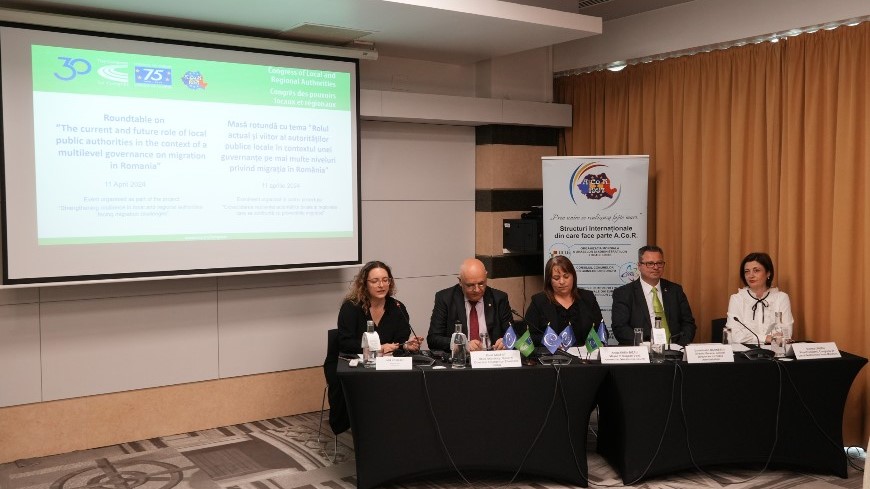
Representatives from Romanian local and central authorities, as well as civil society and international organisations gathered in Bucharest on 11 April 2024 for a roundtable to discuss “The current and future role of local public authorities in the context of a multilevel governance on migration in Romania”. Project partners from Poland and the Republic of Moldova joined the discussion, sharing insights and practices from their own contexts.
Discussions included an exchange of views with high-level representatives from the central authorities responsible for emergency responses and immigration issues. The participants identified areas that can further strengthen responses and integration mechanisms for migrants and refugees, and increase the role and preparedness of local authorities in that area.
The participants also took stock of the accomplishments and ongoing challenges that stakeholders had encountered in migration management due to Russia’s war of aggression again Ukraine. Furthermore, the roundtable helped to formulate specific proposals for improving multilevel coordination and dialogue, identified areas for possible legal and policy adaptation, and established priorities for capacity building of local public administration institutions.
The roundtable discussion was based on the findings of a country-specific report [E N / ROM], focusing on migration-related challenges and ways forward in the Romanian context.
The Centre of Expertise for Good Governance at the Congress of Local and Regional Authorities organised the roundtable jointly with the Association of Communes of Romania (ACoR) in the framework of the project “Strengthening resilience in local and regional authorities facing migration challenges”. The project is implemented within the Council of Europe Action Plan on Protecting Vulnerable Persons in the Context of Migration and Asylum in Europe, and with the financial contribution of Germany.
- Diminuer la taille du texte
- Augmenter la taille du texte
- Imprimer la page
Council of Europe Congress examines the application of the European Charter of Local Self-Government in Finland

A delegation from the Congress of Local and Regional Authorities of the Council of Europe composed of rapporteurs Konstantinos Koukas (Greece, EPP/CCE) and Rachel Bailey (United Kingdom, ECR), will carry out a monitoring visit to Finland from 16 to 18 April 2024 to assess the application of the European Charter of Local Self-Government since the previous monitoring report adopted by the Congress in 2017 and the implementation of the latest Recommendation 396 (2017). They will be accompanied by Tania Groppi, Vice-Chair of the Group of Independent Experts on the European Charter of Local Self-Government (Italy). The Congress delegation will meet with Jussi Halla-aho, Speaker of the Parliament, Kari Kuusiniemi, President of the Supreme Administrative Court, Juhana Vartiainen, Mayor of Helsinki, as well as the Finnish delegation to the Congress, the Association of Finnish Local and Regional Authorities, and representatives of various ministries and institutions at all levels of government in Finland.
Finland ratified the European Charter of Local Self-Government in 1991. Countries that have ratified the Charter are bound by its provisions. The Charter requires respect for a minimum number of rights, which form the European foundation of local self-government. The Congress of Local and Regional Authorities ensures that these principles are respected. Finland also ratified the Additional Protocol to the European Charter of Local Self-Government on the right to participate in the affairs of a local authority in 2012.
Contact: Svitlana Pereverten
- Diminuer la taille du texte
- Augmenter la taille du texte
- Imprimer la page
Armenia: Grants to local authorities for better intermunicipal co-operation and help with welcoming refugees
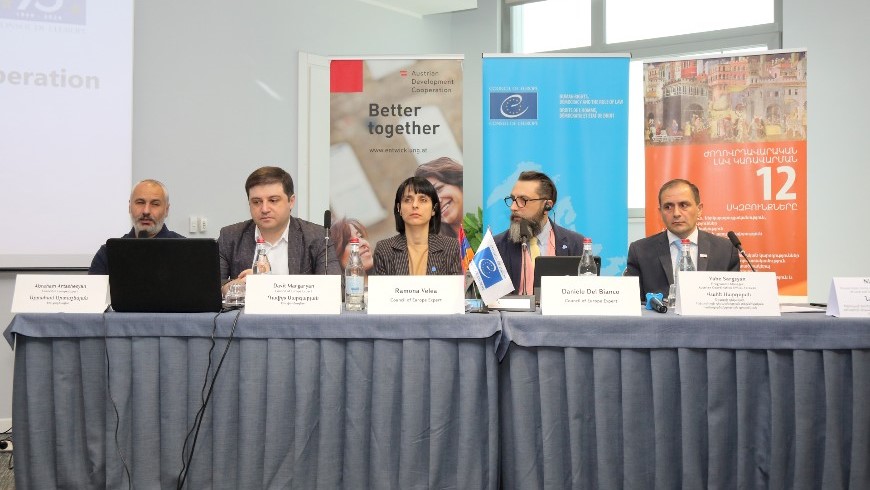
“What we cannot do alone, we can achieve together.” Local leaders and economic development officers from 42 Armenian local authorities expressed optimism about the potential for intermunicipal cooperation to help deliver better services to citizens, during a series of workshops organised by the Centre of Expertise for Good Governance (CEGG) in Yerevan. The workshops followed the recent awarding by the CEGG of 11 grants to local authorities in Armenia to develop feasibility studies into opportunities for intermunicipal cooperation.
On 11 April 2024 – the same day as the launch of the Council of Europe’s comprehensive response package to the refugee influx in Armenia – a dedicated workshop on Resilience Building Strategies (ReBuS) was organised to support communities in developing effective responses to the influx of refugees from Karabakh. The Resilience Building Strategies approach is in line with the recent Congress Recommendation 510 (2024) on Local and regional responses to natural disasters and climate hazards: from risk preparedness to resilience, adopted in March 2024. At the same time, a deadline for communities hosting refugees from Karabakh to apply for a grant to address immediate and mid-term needs was extended until 19 April 2024.
These activities were organised under the Democratic Development, Decentralisation and Good Governance in Armenia - Phase 2 project and the Project “Support to Communities Hosting Refugees in Armenia”, implemented by the Centre of Expertise for Good Governance at the Congress of Regional and Local Authorities as part of the Council of Europe Action Plan for Armenia 2023-2026, with funding from Austrian Development Cooperation. The project aims to support the adoption of revised legislative framework for local self-government in line with European standards to reflect the new territorial-administrative map of Armenia and develop the capacities of local authorities of the newly enlarged communities to fulfil the competences and deliver the services entrusted to them under the decentralisation strategy.
- Diminuer la taille du texte
- Augmenter la taille du texte
- Imprimer la page
Strengthening a youth perspective within the Council of Europe: Congress Secretary General meets youth representatives
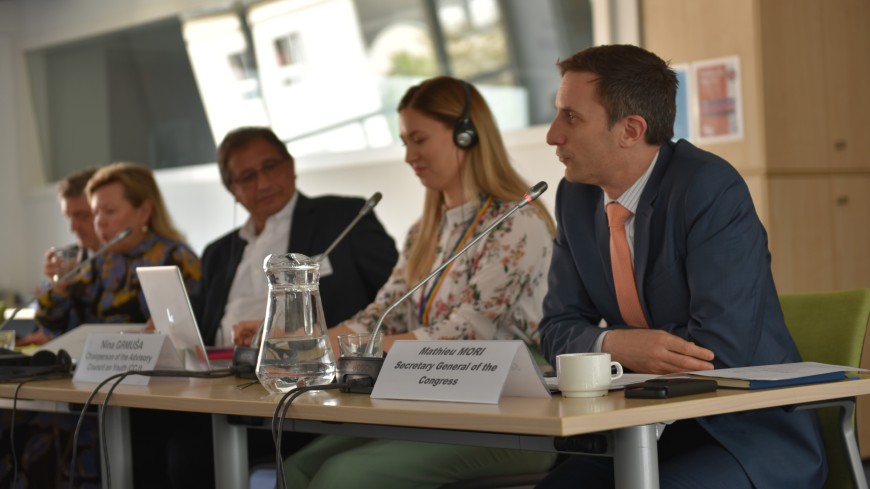
“Many young people are still not able to contribute meaningfully to political debates or can only do so under agendas that they have not shaped themselves”, stressed Congress Secretary General Mathieu Mori, praising in this regard the important work done by the Joint Council on Youth to overcome such shortcomings in youth participation. Addressing the Council at its 50th meeting in the European Youth Centre Budapest on 9-10 April 2024, he underlined that many cross-overs already existed between youth activities undertaken by the Congress and intergovernmental bodies on youth, and pointed to the opportunities for reinforcing this partnership in the run-up to the Committee of Ministers’ Presidency of Malta in 2025 which aimed to put youth policies at centre stage.
Great interest in pursuing the close collaboration with the Congress was expressed by members of both the European Steering Committee for Youth and the Youth Advisory Council who regularly participate in the Joint Council under the co-management structure of the Council of Europe youth sector. In a dynamic exchange, the results of previous co-operation activities were recalled, for example in the areas of rural youth or youth work in disadvantaged neighbourhoods. On this occasion, the Secretary General announced the new revision of the Revised European Charter on the Participation of Young People in Local and Regional Life – a process that had just been initiated by the Congress in this year of the 10th anniversary of its own Youth Delegates initiative “Rejuvenating politics”.
- Diminuer la taille du texte
- Augmenter la taille du texte
- Imprimer la page
Inter-municipal co-operation under martial law in Ukraine: taking stock of existing practices and ways forward

The Law on Inter-municipal Co-operation (IMC) was one of the first steps in Ukraine’s journey of decentralisation reform. After nearly 10 years of its implementation, the Centre of Expertise for Good Governance is revisiting this topic with its Ukrainian partners, based on a survey and analysis of the state of play in the area.
During a moderated discussion on 8 April 2024, more then 150 participants, including members of the Parliament, Government officials, as well as representatives of local authorities and their associations, civil society and experts shared their reflections and ideas. Based on the survey results, 50% of Ukrainian municipalities had some experience of inter-municipal co-operation, with most IMC projects focused on co-financing of service provision to citizens. Education, health care and utilities (including water supply and solid waste management) were priority services provided under IMC agreements. At the same time, almost 90% of respondents indicated that IMC would become crucial for the post-war recovery and reconstruction of Ukraine, emphasising the need for a more structured, diverse and flexible legal regulation of this instrument, taking into account also specificities of IMC in metropolitan areas.
The Centre of Expertise will continue its support to Ukraine to improve the legal framework on IMC, with a series of thematic consultations already planned for April 2024.
The activity was organised by the Programme “Strengthening Good Democratic Governance and Resilience in Ukraine” in co-operation with the Specialised Parliamentary Committee on Local Self-Government. The Programme is implemented under the Council of Europe Action Plan for Ukraine “Resilience, Recovery and Reconstruction” 2023-2026 by the Centre of Expertise at the Congress of Local and Regional Authorities of the Council of Europe.
- Diminuer la taille du texte
- Augmenter la taille du texte
- Imprimer la page
Local authorities in Armenia recommend revisions to the Law on Local Duties and Fees
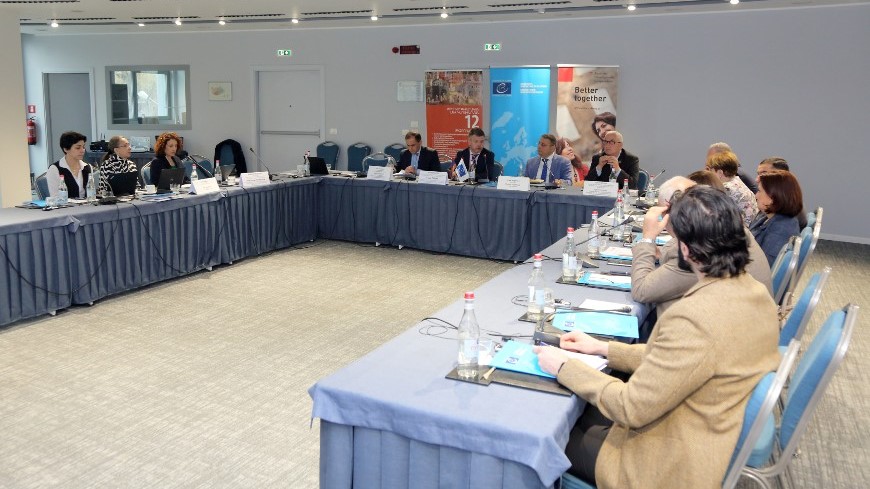
Local authorities in Armenia need adequate financial resources of their own, part of which should be derived from the collection of local duties and fees, in line with Article 9 of the European Charter of Local Self-Government. In preparation for a revision of the Law on Local Duties and Fees, this was the conclusion of local government stakeholders meeting in Yerevan and online on 8 April 2024 for the 9th Community Consultation. They discussed in particular priority areas for improvement to the legislation that would help local authorities develop greater financial autonomy.
An extensive survey of 71 municipalities undertaken in preparation for the meeting resulted in 37 questions and recommendations being submitted for consideration. Contributions addressed issues ranging from practical challenges related to road construction works, or the installation of solar photovoltaic panels to enforcement and compliance measures for non-payment of dues for essential veterinary services.
Participants warned against the risks of over-regulating and stressed that, in order to promote local autonomy, local authorities should be granted sufficient discretion in setting fees and compensation for services to respond to local specificities. The importance of having open and transparent procedures for granting exemptions to avoid corruption risks for local officials was also underlined.
The meeting was organised under the Democratic Development, Decentralisation and Good Governance in Armenia - Phase 2 project, implemented by the Centre of Expertise for Good Governance at the Congress of Regional and Local Authorities as part of the Council of Europe Action Plan for Armenia 2023-2026, with funding from Austrian Development Cooperation. The project aims to support the adoption of revised legislative framework for local self-government in line with European standards to reflect the new territorial-administrative map of Armenia and develop the capacities of local authorities of the newly enlarged communities to fulfil the competences and deliver the services entrusted to them under the decentralisation strategy.
- Diminuer la taille du texte
- Augmenter la taille du texte
- Imprimer la page
International Roma Day: Congress Rapporteur Calls for Support of Roma Rights

As the world marks International Roma Day on 8 April 2024, Gudrun Mosler-Törnström (Austria, R, SOC/G/PD), Standing Rapporteur on Human Rights for the Congress of Local and Regional Authorities of the Council of Europe, reaffirms the Congress’ commitment to protecting the rights of Roma communities.
“Roma continue to face specific challenges, including discrimination, marginalisation, and socio-economic disparities. Local and regional authorities play a crucial role in addressing these issues by fostering inclusive environments and promoting the full integration of Roma communities into local societies,” Ms Mosler-Törnström said, drawing attention to the Congress’ support for local and regional authorities in this effort through its cooperation activities.
“As we commemorate International Roma Day, the Congress calls upon all stakeholders to redouble their efforts in championing the rights and dignity of Roma people, fostering social cohesion, and building inclusive societies where diversity is celebrated and respected,” the Standing Rapporteur concluded.
In a project implemented by the Centre of Expertise for Good Governance at the Congress, recommendations from the Council of Europe/European Union Joint Programme ROMACT will be addressed in a comprehensive training and capacity building curriculum being prepared for Bulgarian local government officials. By promoting dialogue, cooperation between concerned stakeholders, concerted efforts can be made to combat stereotypes, eradicate discrimination, and create pathways for Roma empowerment and participation in decision-making processes.
- Diminuer la taille du texte
- Augmenter la taille du texte
- Imprimer la page
Minister Behrens: Emergency services’ local roots make them more effective
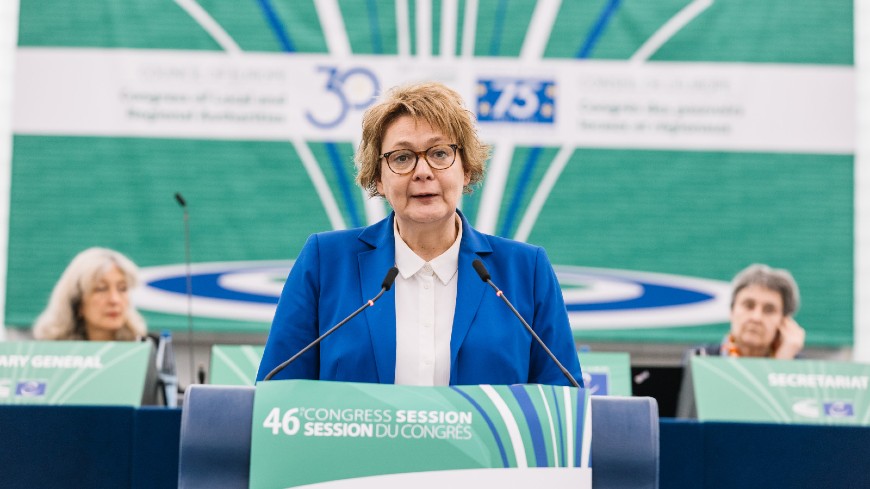
Earthquakes, floods, fires and droughts: while natural disasters are becoming more frequent in Europe and worldwide, local and regional elected representatives highlight the crucial need to “move from crisis management to a real risk culture” embraced by all stakeholders. In a recommendation and a resolution debated and adopted on 28 March, the Congress put forward many proposals to that end.
As co-rapporteurs on “Local and regional responses to natural disasters and climate hazards: from risk preparedness to resilience,” Jean-Paul Bastin (Belgium, L, EPP/CCE) and Christian Debève (France, R, ILDG) based their work on the visits they paid to Türkiye and Spain in 2023, and a study of the flooding in Belgium in 2021. They particularly stress the importance of continuous and transparent communication with the affected communities, both to improve co-ordination of relief efforts and to prevent panic. Residents need to be better prepared at local level for natural disasters, which are becoming increasingly likely because of global warming. With input from the youth delegates, the report focuses on the inclusion and involvement of all residents to boost the resilience of society as a whole.
Drawing on the lessons learnt from the severe flooding that devastated the Land of Lower Saxony in Germany between December and January, its Minister for the Interior, Daniela Behrens, described the regional civil defence measures, whose local roots in the worst-affected areas had facilitated the relief efforts. “Of course, we received assistance from the neighbouring Länder and several other European countries, but it is first and foremost our high level of preparedness that enabled us to respond rapidly, including through the effective co-operation between the professional emergency services and volunteer firefighters and other relief personnel, many of whom left their usual jobs to come to the aid of the residents,” she said. Lower Saxony was now considering introducing compulsory insurance for homeowners to cover the costs of such floods, the objective being anticipation and resilience. There were also plans to further strengthen the disaster management skills centre which had already been set up in the Interior Ministry before the latest crisis.
Improving rescue workers’ training and anticipating risks
Opening the debate, Bryony Rudkin (United Kingdom, L, SOC/G/PD) stressed the importance of properly documenting disaster responses and measures so as to facilitate the gathering of experience and, in this context, improve training for all involved. Her compatriot, Joanne Louise Laban (United Kingdom, L, ECR), also called for better training for civil defence personnel.
Davit Khazhakyan (Armenia, L, ILDG) pointed out that a very large proportion of the buildings in the former Soviet republics were of a poor standard and not very resistant to hazards, in particular seismic hazards. Nicknamed “Khruschev buildings,” these properties from the 1950s and 1960s all needed to be completely refurbished, which was very expensive but vital. Cemal Bas (Türkiye, L, EPP/CCE) was also very critical of the standard of many buildings destroyed during the 2023 earthquakes, saying that his country had clearly neglected safety before the disaster, while paying tribute to the international support and solidarity that it had received to tackle it.
Local authorities must be involved in drawing up disaster relief plans
Two Italian members, Franco Iacop (L, SOC/G/PD) and Belinda Gottardi (L, SOC/G/PD), both said that local authorities should be more closely involved in determining preventive investments and in drawing up disaster relief plans. Ms Gottardi said that she did not know “how many more disasters it will take until national governments finally recognise the importance of our role on the ground,” and called on the Congress to continue promoting its proposal to draft an additional protocol to the Charter concerning the environment.
The youth delegates made their voices heard, emphasising the need to train young people in disaster prevention and involve them in organising and conducting relief efforts. The Irish youth delegate, Jack O’Connor, pointed out that governments should not just consult their usual experts when it came to anticipating crises and providing responses, but should also turn to groups that that were directly threatened or affected and give them a voice in a democratic and participatory manner, taking care to include both the youngest and the most elderly.
Lastly, in response to a question from Clemens Lammerskitten (Germany, L, EPP/CCE), Ms Behrens praised not only the interregional co-operation during the floods but also the smooth functioning of the European civil defence warning system. “Within 36 hours, France sent us the temporary dykes we needed,” she said. She would like to go further by arranging joint exercises between countries, for instance between France and Germany or between Germany and Poland.
***
- Diminuer la taille du texte
- Augmenter la taille du texte
- Imprimer la page
Local authorities and the environmental crisis
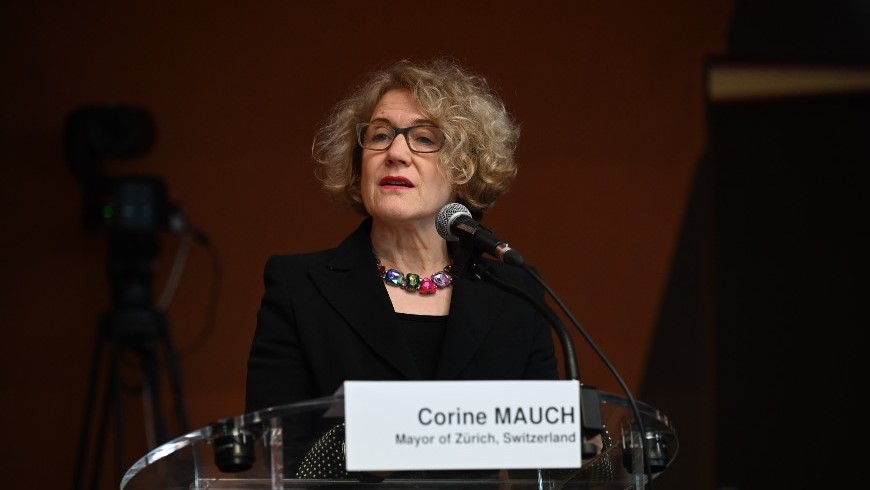
Nobody doubts the reality of the environmental crisis and climate change anymore.
According to the Copernicus European observatory, 2024 started with the hottest January ever recorded. Towns and regions in Europe are being hit by natural disasters more and more frequently. Underlining the commitment of the Congress to promote “a fundamental right to the environment”, in particular by promoting the drafting an additional protocol to the European Charter of Local Self-Government, the President of the Chamber of Local Authorities, Bernd Voehrigner, also pointed out that the vital part played by local and regional authorities in protecting the environment had been recognised in May 2023 in the Reykjavik Declaration by Council of Europe Heads of State and Government.
Einar Þorsteinsson, Mayor of Reykjavik, demonstrated that preserving cultural and social traditions was not incompatible with reducing his city’s carbon footprint. Public thermal pools, which were so important to Icelanders, were now heated with green energy. Reykjavik had actually started developing geothermal energy in the 1930s and was now the city with the best geothermal urban heating system in the world. In his view, improving public health through the development of pedestrian and cycle routes which encouraged physical exercise was one of the best arguments for promoting the Green Deal among the public. It was also a key asset in the discussions aimed at drastically reducing the carbon emissions produced by cars, without, of course, forgetting the need to develop efficient and fast public transport services. His city had set the target of reducing CO₂ emissions by 50% by 2030 and a further 50% by the end of the following decade. This goal was being supported by the development of new technologies for capturing CO₂ from the atmosphere and storing it underground. Underling the ability of towns and cities to put pressure on central governments, in particular through transnational networks, the mayor of Reykjavik praised the role of the Congress and the Council of Europe in co-ordinating local and regional authorities’ efforts in environmental matters, notably through legal instruments to defend local self-government and fundamental human rights.
Zurich, which is often cited as one of the most sustainable cities in Europe, is also a pioneer in terms of environmental measures. Highlighting the Swiss government’s reluctance to pass strong legislation to combat pollution and global warming, in particular owing to the electoral unpopularity of some measures, Zurich Mayor Corine Mauch presented the ambitious policy of her city which, as far back as 2008, seven years before the Paris Agreements, had already taken steps which had enabled it to reduce its greenhouse gas emissions by 35% by 2010. Unlike the Swiss parliament, in 2022 Zurich residents had voted in favour of the target of net zero emissions by 2040. Regular reports by the municipal council would keep track of the progress of the policy, which included transforming the collective heating system with aid for private individuals, encouraging the circular economy and development of pedestrian neighbourhoods with local shops and services, providing 130 km of cycle paths, various measures to combat food waste and promote “sustainable eating”, support for businesses and NGOs that were partners in the city’s green policies, etc. To fund these projects, Zurich had taken out a green loan and was also intending to reduce its energy bills. Its mayor was therefore optimistic and convinced that local authorities could use political levers at local level to become leaders in environmental change.
Lastly, the youth delegate from Cyprus, Liana Liu Ioannides, urged her elders to provide a legal basis for and make compulsory young people’s participation in environmental policies and the Green Deal in Europe: “Young people can play a leading role, which local, regional and national authorities are depriving themselves of by often ignoring our calls and proposals. We can help you to harmonise policies in the various member countries and also to win public support. Losing young people’s potential means losing their trust.” Speaking on behalf of all the Congress youth delegates, Liana Liu Ioannides said that adding an additional protocol on environmental protection to the Charter of Local Self-Government would not be enough unless compliance with the Charter and the involvement of young people in environmental decision-making were made compulsory.
Over 15 Chamber members put forward their points of view and proposals during the debate which followed the addresses. They highlighted the primary role played by local and regional elected representatives in tackling the climate emergency, and the importance of leveraging their skills and financial resources to this end. They also stressed the need to synchronise local authorities’ action through international bodies like the Congress, in particular if the aim was to identify the best solutions for shared problems such as rising sea levels in coastal areas, coastline retreat, and the need to remove concrete and tarmac to counter flooding and urban heatwaves, etc. The war in Ukraine was also mentioned as a factor in massive ecocide that demanded concerted European aid. Joining together and better co-ordinating the efforts of Europe’s towns, cities and local and regional authorities would also enable pressure to be put on national governments, whose environmental policies often lacked ambition. The debate confirmed the need for the Council of Europe to draw up a text committing member states to raising awareness among local elected representatives of their responsibility to opt for green local governance within the framework of their competences.
***
- Diminuer la taille du texte
- Augmenter la taille du texte
- Imprimer la page
Congress supports democratic forces and civil society of Belarus
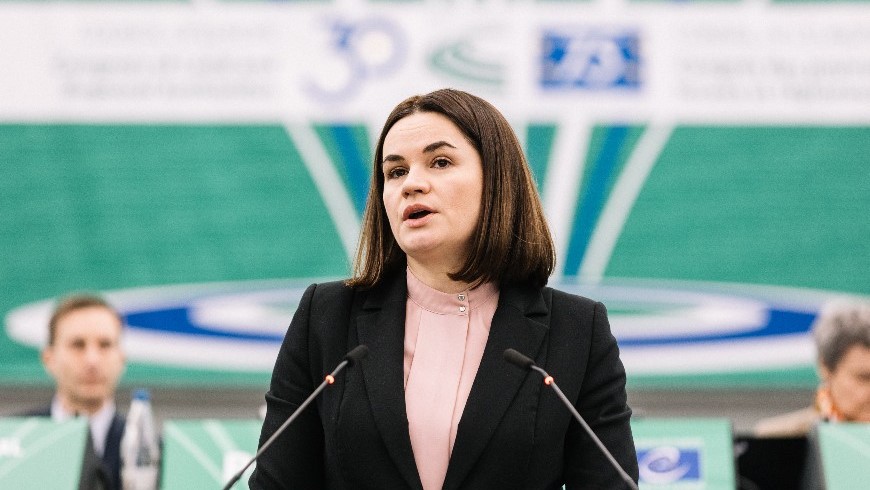
The Congress has joined the initiative of the Council of Europe, which has already set up a contact group with the democratic forces and civil society of Belarus. As guest speaker at the plenary session on 27 March, Belarus democratic opposition representative Sviatlana Tsikhanouskaya called for solidarity from local and regional authorities in Europe, who are an important asset in the struggle for a democratic Belarus.
In response to the repression and muzzling of the opposition in the country following the uprising triggered by the disputed re-election of dictator Alexander Lukashenka in August 2020, a whole range of structures have been set up outside the country to fight against the authoritarian regime in power. For over three years, powerful networks of activists in exile in Vilnius, Kyiv, Warsaw and elsewhere in Europe have been calling on the international community to work together to build a democratic Belarus freed from the stranglehold of the Russian regime and the Lukashenka dictatorship.
Speaking at the plenary session of the Congress on 27 March, Sviatlana Tsikhanouskaya, representative of the Belarus democratic forces, painted a tragic picture of the regime’s repression of its opponents ever since her childhood: “We were brought up never to stick out from the crowd, and to be submissive. But since the uprising in 2020, the Belarus people have woken up. We have set up a self-organised government with responsible and courageous individuals whom the KGB has not managed to deter, in spite of violence and imprisonments. A crowdfunding system has enabled us to keep going, especially abroad where diaspora groups plead our people’s cause through people’s embassies in various countries on a daily basis. We have already drawn up a set of reforms and a new constitution to change our country as soon as a window of opportunity arises. Our aim is to build a democratic regime, a state genuinely governed by the rule of law, as a member of the European family, but we won’t be able to make the change as long as we have Russian soldiers’ boots on our territory and a dictator in power.”
The goal of joining the European Union is part of the agenda of the Belarus opposition, which claims to express the views of the country’s younger generation. The Belarus democratic forces regard the Council of Europe as the institution accompanying countries in their democratic transformation, which is why it sets such store by co-operating with its various bodies, in particular the Congress.
In her address, Sviatlana Tsikhanouskaya called for practical support from Congress members, who could help the Belarus democratic forces to prepare the reform of self-governance and local self-government.
The Belarus democratic opposition representative also proposed that the Congress launch a support programme for children of political prisoners and veterans who have fought side by side with Ukrainians since 2014, while also offering scholarships for young people to enable them to study and observe the democratic functioning of local and regional authorities in Europe. Lastly, she referred to the need to promote a broad coalition of countries to make the case for Belarus’ European integration with the European institutions.
The debate that followed Sviatlana Tsikhanouskaya’s address showed the commitment of Congress members, from Georgia to the United Kingdom, to providing practical assistance to Belarus’ democratic diaspora and civil society. “Your country hasn’t been forgotten!” said Gunther Bergmann (EPP/CCE), backing up his comments with an example because on 25 March his region of North-Rhine Westphalia had approved a programme to support Belarusians who had fled to Germany. Telling the story of a French citizen of Belarus origin, a sociologist at the University of Strasbourg who had been sentenced to prison by the Lukashenka regime for writing a dissertation condemning the dictatorship, Véronique Bertholle, Deputy Mayor of Strasbourg (SOC/G/PD), expressed the Strasbourg city council’s unwavering support for the Belarus diaspora.
At the close of the plenary session, Ms Tsikhanouskaya thanked the Congress and shared her feeling of being among friends who gave her encouragement to continue her democratic mission.
***
- Diminuer la taille du texte
- Augmenter la taille du texte
- Imprimer la page
Exodus of services of general interest from peripheral and rural areas
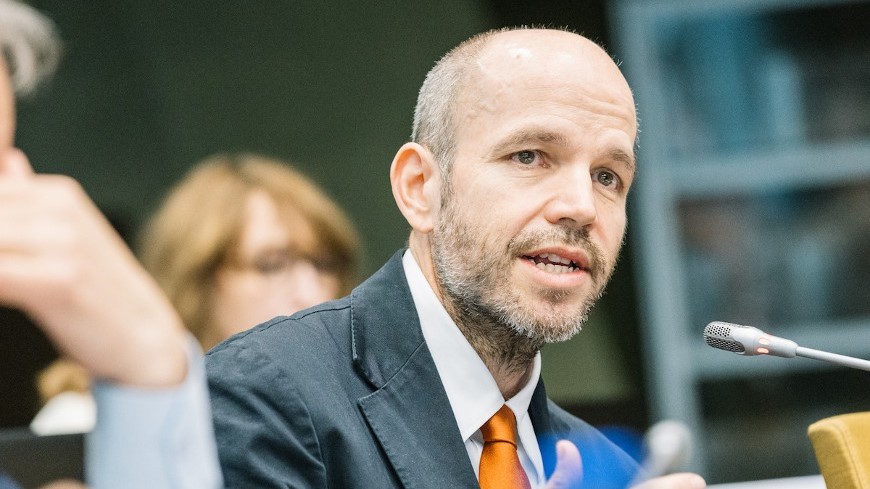
Radim Srsen: “people should be encouraged to stay in rural areas or return to them”
The problem is a familiar one: public services in peripheral and rural areas with declining populations deteriorate or disappear, prompting still more inhabitants to leave in turn. This vicious circle can only be broken through effective decentralisation enabling the balance between regions to be restored and making them attractive again, concluded the participants in the debate held on 27 March in the Chamber of Regions on the “exodus of services of general interest from peripheral and rural areas”.
Enrique Garcilazo, the Head of the OECD’s Regional and Rural Policy Unit, said that 40% of isolated or peripheral areas had seen a decline in their population and that, of these, 60% were a long way from major cities. The trend had slowed in recent years but had picked up again since the Covid crisis and the war in Ukraine, particularly as a result of the return of inflation. All these indicators showed that the rift was widening, an example being the quality of bandwidth, which was improving in cities but deteriorating elsewhere. This increased the digital gap between urban and rural areas, with impacts in terms of jobs and the economy. These imbalances were also seen in the area of health and education facilities and called, in Mr Garcilazo’s view, for long-term spatial planning, between now and 2060 and beyond, catering harmoniously for both rural and urban areas.
Languages, cultures, identity: rural areas are the soles of nations
Viorel Furdui, Moldova’s Director General of Local Authorities and a local councillor himself, emphasised how important public services were for rural communities and considered that rural areas and small municipalities were worth saving, in particular because, through their language, culture and identity, they were the “sole of nations”. It was important to avoid radical and poorly prepared town planning reforms and instead to encourage co-operation between municipalities to identify their needs. Decentralisation was a key factor but so was the involvement of associations of municipalities and local councillors.
Radim Srsen, the Czech Deputy Minister of Regional Development, said that peripheral areas needed to become attractive again, particularly for young people, because retaining them or making them return was the key to development. Owing in particular to digital infrastructure, there was already a noticeable trend in some countries such as South Korea for young people to move back from the cities to rural areas. Telemedicine and telework were successful initiatives which prompted inhabitants to return to areas prone to depopulation.
Young people were often the main protagonists of the rural exodus, according to the young Spanish delegate, Maria Virginia Iliata: “many think that they cannot make a living in these isolated areas” she explained, regretting that living far from cities often meant putting up with highly inadequate transport infrastructure and accepting the prospect of unemployment. In Castilla-la-Mancha for example, over 20% of young people were unemployed. Of course, telework could improve things but there was also a more general need to give young people the means of finding a future where they came from.
Many young people were forced to leave their homes, especially for their studies, whereas better planning would help to avoid such departures. The young Armenian delegate, Taisya Hovhannisyan, regretted that Armenia’s main universities were concentrated in the capital, Yerevan. For most young people, the cost of living there was unaffordable, and this prevented many from accessing higher education, whereas they could if facilities were closer to home.
Highlighting the benefits of peripheral and rural areas
Markus Gleichmann (Germany, R, SOC/G/PD) considered that “the drawbacks of rural areas had to be converted into assets”, including where it came to installing the energies of the future, such as solar panels or biogas, which would also be of benefit to the local economy. Peripheral areas also had advantages which the inhabitants of the main conurbations were unaware of: “my region, Frisia, is far less wealthy than the rest of the country”, said Eke Folferts (Netherlands, R, EPP/CCE), “but it is where people are happiest, thanks in particular to its strong social cohesion”. Campaigning by local inhabitants could also help local authorities save facilities, such as the school rescued by the locals and now attracting new pupils in the district in which Rachel Bailey (United Kingdom, R, ECR) was councillor.
***
- Diminuer la taille du texte
- Augmenter la taille du texte
- Imprimer la page
Congress congratulates Ukraine on 10 years of its decentralisation reform
- Diminuer la taille du texte
- Augmenter la taille du texte
- Imprimer la page
Congress’ 30th anniversary: Looking ahead
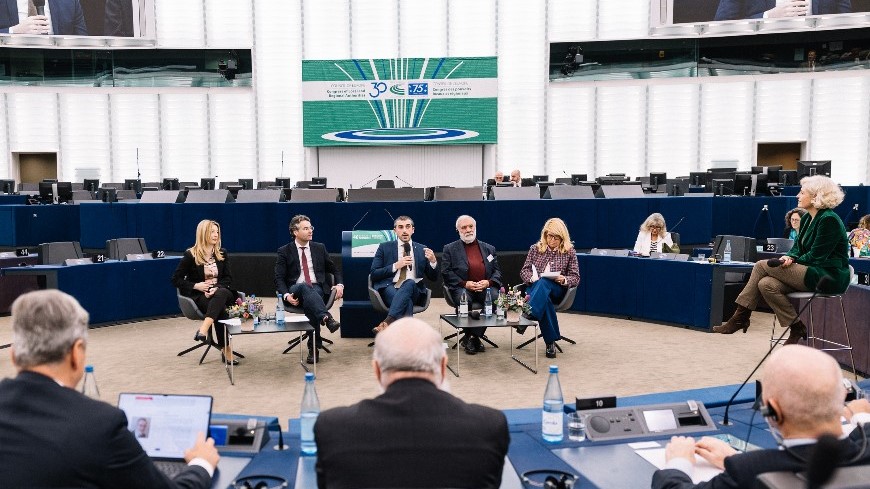
During its 46th session, on 27 March 2024, the Congress held a special ceremony to celebrate its 30th anniversary. Congress President Marc Cools and Deputy Prime Minister of Liechtenstein Sabine Monauni delivered opening speeches, while President of the European Committee of the Regions Vasco Alves Cordeiro sent a video message. Opening speeches were followed by a round table on “New challenges ahead: is local democracy fit for purpose?”, with the participation of Dominique Faure, Minister with responsibility for Local Government and Rural Affairs of France; Josep Dallerès, member of the Council of Europe High-Level Reflection Group and former Permanent Representative of Andorra to the Council of Europe; Danela Arsovska, Mayor of Skopje (North Macedonia) and Chair of the UN Forum of Mayors; José Manuel Ribeiro, Mayor of Valongo (Portugal); and Željko Vukša-Fejzić, 2023 Youth Delegate to the Congress from Bosnia and Herzegovina.
The celebratory event honored the Congress's history by uniting six former Presidents and the three most recent Secretary Generals. Additionally, a video archive from Jacques Chaban-Delmas, the first president of the Conference of Local and Regional Authorities of Europe, was showcased.
“The challenges faced by our societies today require us to double our efforts to provide the best responses for the benefit of our fellow citizens. Our progress and successes over the last three decades give me confidence that local and regional democracy in Europe, and our Congress, are well equipped to meet them,” stressed in his opening speech President Cools. Deputy Prime Minister Monauni emphasized the efforts carried out during Liechtenstein's Presidency of the Committee of Ministers to face these challenges. President Cordeiro, in his video message, underlined the important collaboration between the two organizations and expressed his determination to enhance it.
Preceded by a musical interlude, the main highlight of this celebration was a round-table discussion devoted to “New challenges ahead: is local democracy fit for purpose?”. This discussion provided an opportunity for several speakers to address the challenges confronting democracies. In response to these challenges, they collectively voiced optimism and proposed solutions to strengthen local democracy.
Minister Faure recalled that "local democracy will be vital in tackling the challenges of transition that lie ahead: ecology and climate change, digital technology and artificial intelligence, as well as cohabitation and social cohesion". Ambassador Dallerès highlighted the need to recognise democracy as a culture that requires to be taught and learned, and to create a “Reference Framework of Competences for Democratic Culture” at the local level. Mayor Arsovska, for her part, pointed to the need for the institutions to encourage the political involvement of women, especially by “showing sincere supports in the ambitions of women, and making it possible for us to tackle the violation we face in our everyday life.”
“Representative democracy and participatory democracy are like two twin sisters: they grow with each other and learn from each other”, underlined Mayor Ribeiro, adding that the mechanisms of participatory democracy served as a countermeasure to authoritarian tendencies. Željko Vukša-Fejzić praised initiatives, such as the "Rejuvenating Politics", which provide a platform for young people to express themselves. “They are a promise, a contract for the future […] These programs must reach every corner of Europe, and even beyond”, he said.
Statement by President Marc Cools (French only)
***
- Diminuer la taille du texte
- Augmenter la taille du texte
- Imprimer la page
Chamber of Regions debates the model of intercultural regions
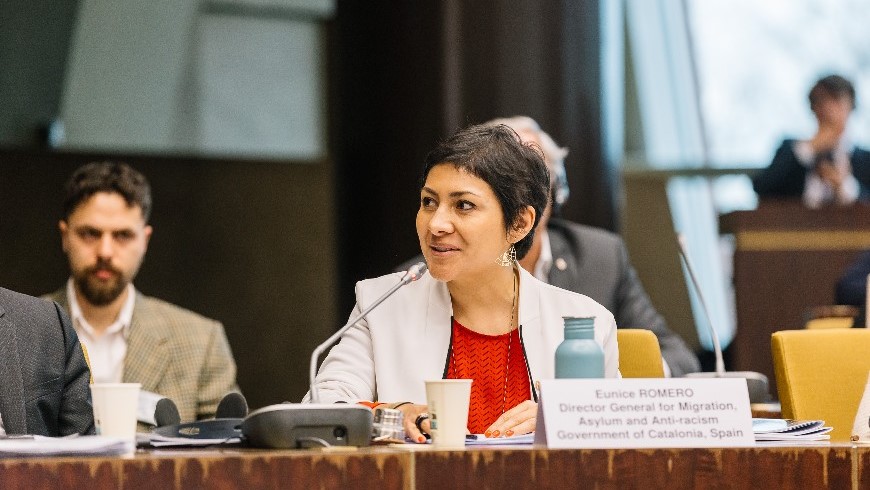
On 27 March, the Congress’ Chamber of Regions held a round-table on “Intercultural regions: embracing diversity”, moderated by Congress Vice-President Gunn Marit Helgesen (Norway, EPP/CCE).
An anti-racial approach to integration, which underpins the model of intercultural regions, was presented by Eunice Romero, Director General for Migration, Asylum and Anti-racism of the Government of Catalonia (Spain) and Chair of the Intercultural Regions Network of the Assembly of European Regions (AER). Recognising that racism is embedded in society, she suggested regions work towards a paradigm that sees the needs of the individuals take the centre stage. “Every case of racism means a failure in the protection of the fundamental rights of citizens” she said, underlining that “inclusion is not about migrants, it is about human rights”.
Congress Vice-President Lia Montalti (Italy, SOC/G/PD) stressed that her region, Emilia Romagna, recognises the migratory phenomenon as structural. Given the heterogeneity in terms of social status, culture and professions of people arriving in Emilia Romagna, the region adopts ad hoc measures instead of standardised ones. Regional action on integration addresses four transversal themes: namely equity between gender and generations; autonomy and “feasibility”, namely giving newcomers the conditions to realise their real integration; re-thinking the static model of integration; and simplification of digital access. On the other hand, she stressed the need to make the integration process smoother, by simplifying administrative procedures and providing newcomers with the possibility of accessing residential rentals.
Due to important industrial investments that will contribute to a zero-carbon society, the whole region of Västerbotten in Sweden is experiencing the arrival of a great number of workers coming from different parts of the world, said Daniel Sjögren, Chairman of the Arts and Culture Committee of Skellefteå Municipality. This city in particular has received 8000 new workers of more than 100 different national backgrounds over a short time period. This situation represents a challenge of maintaining cohesion among different groups, including preserving the cultural heritage of Sami indigenous people. On the other hand, some intercultural projects are already ongoing, such as the Sara Kulturhus culture centre.
According to Afia Mansoor Ahmed, Congress Youth Delegate from Germany, the risk of listening or reading a “single story” is that authorities find insufficient solutions to face the challenges that integration poses today. She wishes more diversity and participation in the job sector, stressing that migrants’ professional competencies are often ignored simply based on their origins. “It is vital for different stakeholders to collaborate,” she said, stressing the need to recognise migrants’ competencies, thus allowing them to contribute their knowledge and skills to providing services that can benefit the entire society.
- Diminuer la taille du texte
- Augmenter la taille du texte
- Imprimer la page
Council of Europe Congress: Local elections in Türkiye overall well organised and respecting the will of the voters
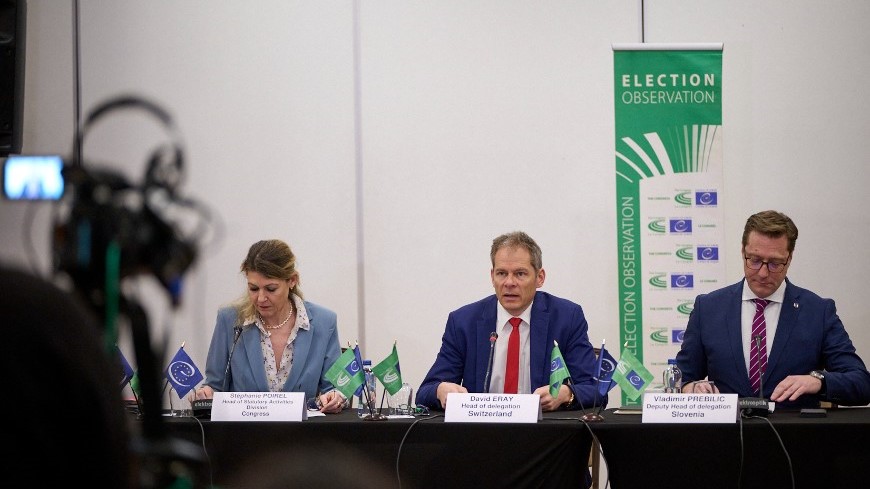
Despite certain deficiencies observed in the electoral campaign, local elections in Türkiye were overall well organised and respected the will of the people – these were the preliminary findings of the election observation mission of the Council of Europe Congress of Local and Regional Authorities.
At the invitation of the authorities of Türkiye, the Congress deployed a mission to observe the local elections held on 31 March 2024 throughout the country. The Congress mission was led by Mr David ERAY (Switzerland, EPP/CCE) and involved 26 Congress observers including 19 Congress members, one expert and five members of the Secretariat, from overall 16 countries.
The deployment on the ground on election day was preceded by preparatory meetings online on 7-8 March and in Ankara on 29-30 March, with the Supreme Electoral Council and representatives of the ministries of interior and of the Environment, urbanisation and climate change. The Congress delegation further met media and NGO representatives, as well as candidates and representatives of various political parties.
On Election Day, 11 Congress teams were deployed to different districts across the country. “Election Day was overall calm and organised in a professional manner, with a high turnout showing a strong commitment of citizens to democratic processes. We acknowledge the logistical organisation that made it possible to handle the large number of voters in a smooth process,” stated David ERAY, at the press conference in Ankara on 1 April.
“The election results showed that the alternation in power between political parties is possible through the expression of the will of the people and their commitment to local representative democracy,” stated Vladimir PREBILIC (Slovenia, SOC/G/PD), Deputy Head of the delegation.
The Congress draft report and recommendation will be submitted for adoption at the 47th Congress session in October 2024.
- Diminuer la taille du texte
- Augmenter la taille du texte
- Imprimer la page
Congress calls for a greater role for local and regional authorities at the United Nations
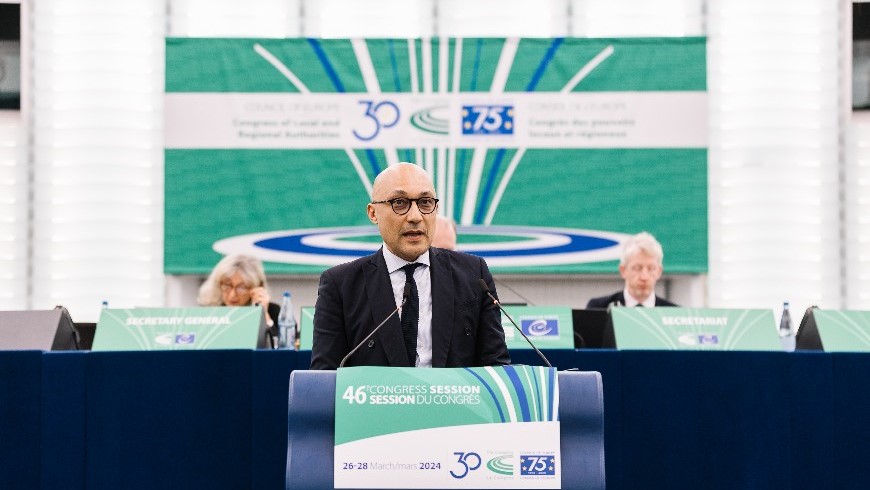
On the last day of its 46th Congress session on 28 March 2024, the Congress adopted a recommendation containing its contribution to the UN Summit of the Future. This summit will take place in New York on 22 and 23 September 2024 and will bring together Heads of State and Government from around the world to discuss concrete steps on how to respond to emerging global challenges. The result of the summit will be a political declaration named Pact for the Future.
As a political assembly of local and regional authorities of 46 member States of the Council of Europe, the Congress is convinced that the current and future global challenges can only be addressed by harnessing the power of local and regional governments as the level closest to citizens. In its recommendation, the Congress called on the Council of Europe member States to support the role of local and regional authorities in delivering the global agenda for sustainable development, including the Pact for the Future.
“Our experience at the Congress shows that institutionalizing the voice of local and regional authorities is an important step towards a meaningful multilevel governance, it leads to a stronger and more effective policy making,” stated Gunn-Marit Helgesen (Norway, R, EPP/CCE), Congress rapporteur on the UN Summit of the Future.
Deputy Mayor of Paris Arnaud Ngatcha informed members about the work of the UN Secretary General’s Advisory Group on Local and Regional Governments which includes Mayor of Paris Anne Hidalgo. He highlighted the importance of adopting a multilevel governance approach to achieving the Agenda 2030. Mr Ngatcha also underlined the important role cities play in combatting climate change, and welcomed the fact that local governments were granted access to the state talks at COP 28.
“The involvement of local and regional authorities in this process can create a strong enabling environment for the successful implementation of Agenda 2030”, concluded Gunn-Marit Helgesen.
- Diminuer la taille du texte
- Augmenter la taille du texte
- Imprimer la page
Deputy Prime Minister of Liechtenstein: Reykjavik Summit reaffirmed the important role of local and regional authorities
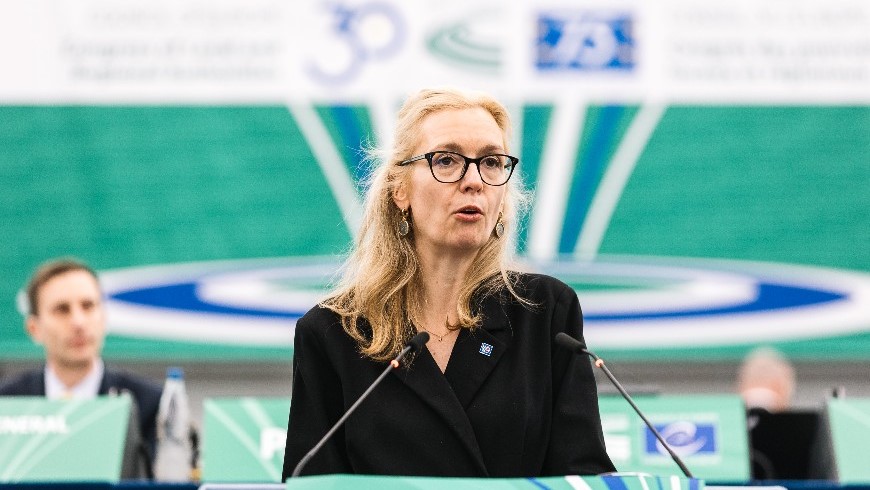
The Council of Europe’s 4th Summit in Reykjavik recognised a crucial role played by local and regional authorities in protecting human rights, stressed Deputy Prime Minister of Liechtenstein Sabine Monauni addressing the Congress session on 27 March 2024 on behalf of the Presidency of the Committee of Ministers.
She welcomed the strengthening of the Congress as a result, noting that the integration of the Centre of Expertise for Good Governance and the European Label of Governance Excellence (ELoGE) within the Congress secretariat provided additional resources for carrying out its statutory duties and implement more projects for the benefit of effective local democracy in member states.
Recalling a strong message of support to Ukraine sent by the Reykjavik Summit, the Deputy Prime Minister commended the readiness of the Congress to help to promote the Register of Damages for Ukraine and to assist local and regional governments and citizens in making claims to the Register. The Register represented the first step towards holding the Russian Federation to account for the destruction caused by its illegal war of aggression against Ukraine.
She also noted the important role of local and regional governments in supporting Belarussian civil society, and praised the Congress’ commitment to promoting youth participation in decision making – referring in particular to its Youth Delegates initiative – and to promoting environmental protection at local level.
***
- Diminuer la taille du texte
- Augmenter la taille du texte
- Imprimer la page
Mykola Lukashuk: “The destruction of the Kakhovka dam deprived all of southern Ukraine of water”
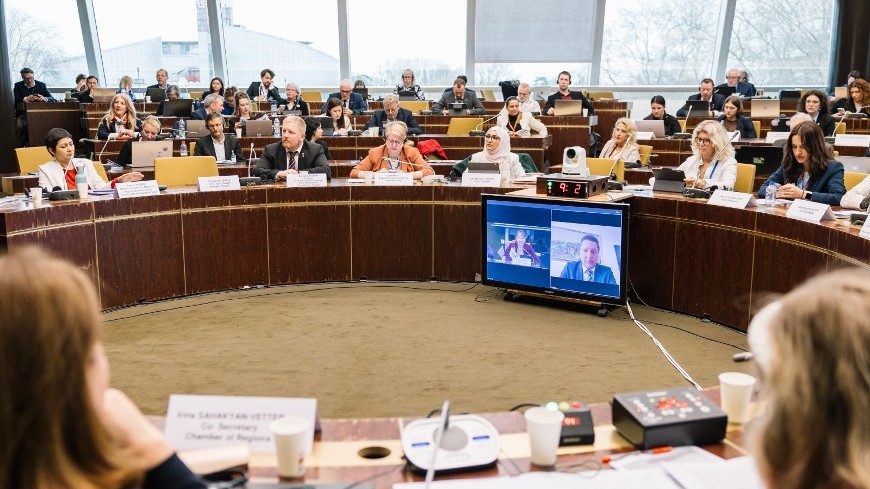
While water is the basis of all life, our societies are not always sufficiently aware of the urgent need to protect it or the consequences of its disappearance: although recognised by the UN as a fundamental human right, access to water is still all too often hindered or flouted, according to the participants in the debate on “Right to water under threat: what is at stake for territories?” held on 27 March at the Chamber of Regions.
Sustainable water management was possible only under a cross-border, interregional approach, said Gunn Marit Helgesen (R, Norway, EPP/CCE) on opening the debate before giving the floor to Tatiana Obydenna, First Deputy Mayor of Nikopol in Ukraine. The destruction of the Kakhovka dam by Russian troops in June 2023 had deprived the city of all water supplies for almost two months, in the midst of the summer heat, and further increased the threats to the Zaporizhzhia nuclear power plant. Nikopol had managed gradually to restore its access to water by digging around forty drinking water wells, thanks to European and international assistance, including from its partner towns, in particular Leverkusen in Germany. However, the destruction of the dam further aggravated the catastrophic environmental damage linked to the Russian aggression against Ukraine, as was stressed by several other Ukrainian elected representatives during the debate. According to Mykola Lukashuk (R, Ukraine, ILDG), Russia had committed ecocide which was now depriving all of southern Ukraine of water, and the flooding resulting from the disappearance of the reservoirs would further complicate the country’s reconstruction. Svitlana Bohatyrchuk Kryvko (R, Ukraine, CRE/ECR) also stressed that the pollution caused by the war was spreading everywhere and ultimately affected the whole of Europe.
Youth delegates propose practical water protection measures
Apart from the tragic example of Kakhovka, the risks surrounding the increasing scarcity of water are a challenge for the whole world. Global warming and rising temperatures, excessive pumping and inappropriate infrastructure, as well as poor governance of resources and pollution of all kinds, in particular agricultural, are all playing a part in making water an increasingly threatened commodity. In a very detailed presentation, the Portuguese youth delegate, Debora Gonçalves, highlighted the potential environmental and health consequences of water shortages, while stressing that they also threatened societies’ political stability and could lead to serious conflicts. “We must not forget how urgent an issue water is,” she added, before setting out several measures proposed by all the youth delegates, in particular the reuse of non-potable water for farming and the application of sustainable development principles across the board in water management. Instead of penalties directed at individuals, the youth delegates also suggested that tax rebates should be granted to families willing to reduce their water consumption voluntarily. In conclusion, she said that the increasingly frequent pollution-related cuts in water supplies should give people cause for thought, as in the case of the water rationing imposed on two days out of three in recent months on the French island of Mayotte.
Protecting the environment also means preserving peace
During the debate, Eirini Douro (R, Greece, SOC/G/PD) called for the right to water to be enshrined in national constitutions, while pointing out that efforts to combat harm to the environment had to go hand in hand with the preservation of peace. Peter Drenth (R, Netherlands, EPP/CCE) also stressed the links between peace and the environment, before Heiner Klemp (R, Germany, SOC/G/PD) raised the issue of the worrying fall in water table levels and called for a reduction in water consumption, not only by the agricultural sector but also by industry and the general public. His home region of Brandenburg, on the border with Poland, had been directly affected in August 2022 by a sharp drop in water table levels, which had increased salinity in the water and caused an unprecedented mass die-off of fish in the River Oder.
***
- Diminuer la taille du texte
- Augmenter la taille du texte
- Imprimer la page
Croatia: Council of Europe Congress welcomes improvements in local and regional governance, though gaps remain
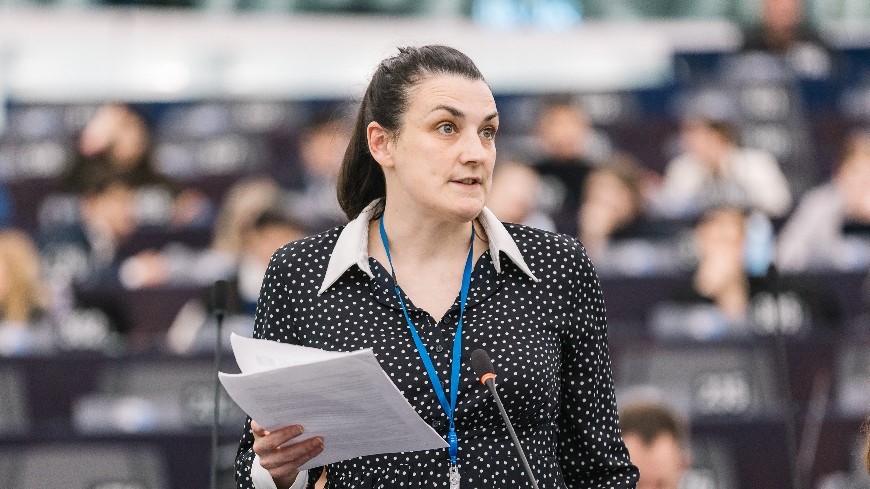
The Council of Europe Congress of Local and Regional Authorities has adopted a set of recommendations to the Croatian government following its June 2023 monitoring of the country’s implementation of the European Charter of Local Self-Government.
The report, drawn up by Gobnait Ni Mhuimneacain (Ireland, L, ILDG) and Cecilia Dalman Eek (Sweden, R, SOC/G/PD) welcomed the fact that counties had taken over administrative functions after state administrative offices were abolished, that tax reform was ongoing, that voluntary mergers were being encouraged and that the process of consulting local and regional representatives had improved, particularly on financial and fiscal matters.
Weaknesses in the administrative and revenue-generating capacity of many small municipalities and cities remained a concern, as did the inadequacy of financial resources available to local and regional authorities, the unclear delineation of responsibilities, and the lack of effectiveness of the financial equalisation mechanism.
The central state administration still held extensive supervisory powers over local self-government, notably to suspend or annul an act made by a local authority without prior judicial review or ruling; dissolve representative bodies; dismiss executive representatives and give instructions on local affairs: all a “potential hindrance” to autonomy, the report warned. Therefore, legislation on supervision should be revised to align it with the principle of proportionality. Furthermore, a formal consultation mechanism with local and regional authorities needed to be set up, and the division of responsibilities required clarification. Croatia should also sign and ratify the Charter’s additional protocol on the right to participate in the affairs of a local authority, which is applied in practice.
The report – the fourth since Croatia ratified the Charter - recommends that Croatian authorities continue supporting inter-municipal co-operation; provide incentives for municipal mergers and adequate financial resources for subnational authorities; revisit the conditions governing local taxation; explore opportunities to diversify subnational income sources; reduce earmarking of grants and transfers and reconsider the criteria on which the equalisation system is based.
Contact person: Panos Kakaviatos, Spokesperson/Media Officer, Directorate of Communications, Council of Europe, tel. +33 6 98 37 64 04
***
- Diminuer la taille du texte
- Augmenter la taille du texte
- Imprimer la page
Council of Europe Congress: local elections in the Republic of Moldova well-administered but the electoral framework needs stability
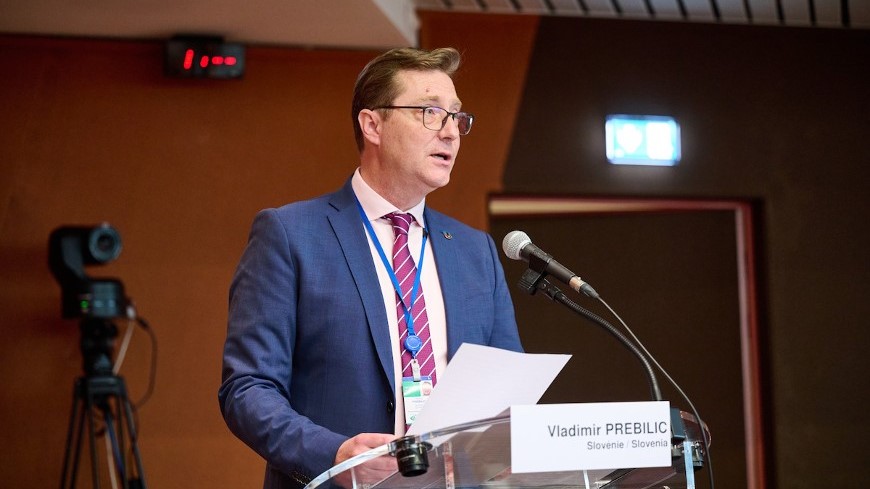
The Congress of Local and Regional Authorities of the Council of Europe welcomed the well-administered local elections in the Republic of Moldova held on 5 November 2023, in a recommendation adopted on 27 March 2024 during the Congress session.
The recommendation, based on a report by Vladimir Prebilic (Slovenia, SOC/G/PD), commended the work of the well-trained election administration and noted that the election day was overall calm and transparent, despite some minor procedural issues; the use of voter identification devices and video cameras, as well as the large presence of observers, contributed to the transparency and trust in the process.
The rapporteur noted that the Congress delegation, which was deployed to several districts throughout the country and visited around 115 polling stations, assessed positively the revision of the Electoral Code in 2022 and was highly satisfied to see that many of the Congress long-standing recommendations – including on gender quotas, requirement for independent candidates and party and campaign finance – had been addressed in the new Code.
The Congress also welcomed the increased oversight of the Central Election Commission over campaign and party finance and the substantial efforts of the election administration to proactively investigate corruption allegations. At the same time, noting numerous and credible reports of corruption of voters and candidates received by the delegation, the Congress called on the authorities to build the administration’s capacities and increased voters’ awareness of prohibited activities.
The Congress also called for more efforts on election dispute resolution, noting that disputes and contradictory decisions related to the right to stand in elections created legal uncertainty and negatively impacted the electoral process. “We believe that the stability of the electoral framework is paramount to ensure trust in the impartiality of the process. We regretted that some decisions were not taken early enough and sometimes without necessary consultations, debate or clear justification”, pointed out the rapporteur.
Finally, the Congress highlighted other areas for improvement, such the low representation of women and the problems with accessibility of polling station. “In addition, we recommend scrapping the age and education requirements for becoming mayor”, concluded Mr Prebilic.
Contact person: Jaime Rodriguez, Spokesperson/Media Officer, Directorate of Communications, Council of Europe, tel. +33 6 89 99 50 42
***
46th Session
Agenda – Web file – Photos
- Diminuer la taille du texte
- Augmenter la taille du texte
- Imprimer la page
Natural disasters and climate hazards: Congress calls on local and regional authorities to be better prepared
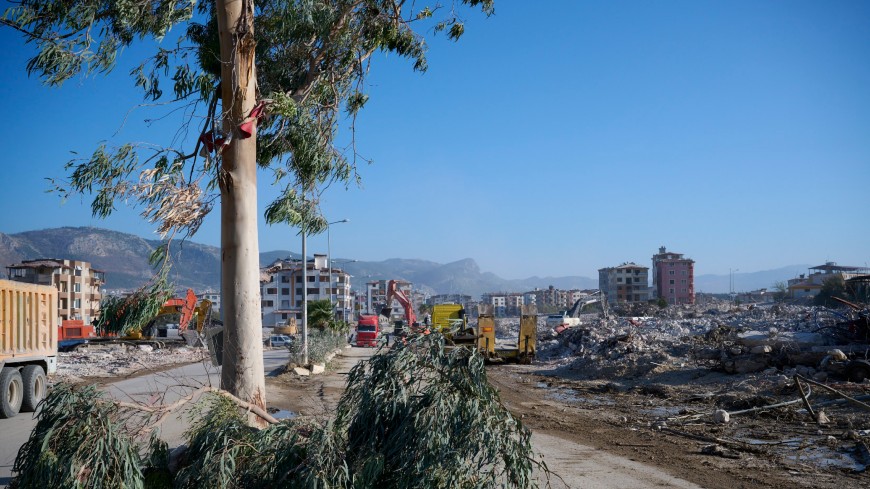
Council of Europe member states are increasingly confronted with natural disasters and climate hazards, and local and regional authorities are in the first line to respond. To do this in the most effective, yet democratic manner, it will be crucial for local and regional authorities to develop a risk management culture, promote territorial solidarity and induce economic, ecological, and social transitions leading to more resilience, finds a report by Jean-Paul Bastin (Belgium, EPP/CCE) and Christian Debève (France, ILDG) presented at the Congress 46th Session on 28 March 2024.
Based on case studies carried out in Belgium, Spain and Türkiye, the report concludes that a concerted effort will be needed, combining short-term and long-term action in a systemic and comprehensive approach to solve both the most urgent problems and get ready for facing upcoming challenges.
The co-rapporteurs emphasised the importance of citizen participation and transparent communication at all times during the crisis management cycle, and of setting up adequate funding mechanisms, holding regular exchanges of good practice and data, providing training programmes to professionals and volunteers, and involving young people at all stages of the process – prevention, relief, training, academic studies, etc-.
Supporting the debate and giving an account of the serious floods that hit her territory only last December and January, Minister for Interior and Sports of the State of Lower Saxony in Germany Daniela Behrens emphasised the importance of European cross-border solidarity and cooperation in matters of disaster protection, both supporting each other with materials and expertise.
The debate was backed up by a photo exposition entitled “Local and regional resilience to natural disasters and climate hazards - a thought-provoking exhibition for local and regional decision-makers“, presenting the images taken in the context of the case studies.
***
- Diminuer la taille du texte
- Augmenter la taille du texte
- Imprimer la page
Fight the upsurge in antisemitism and anti-muslim hatred: a major challenge for European cities and regions
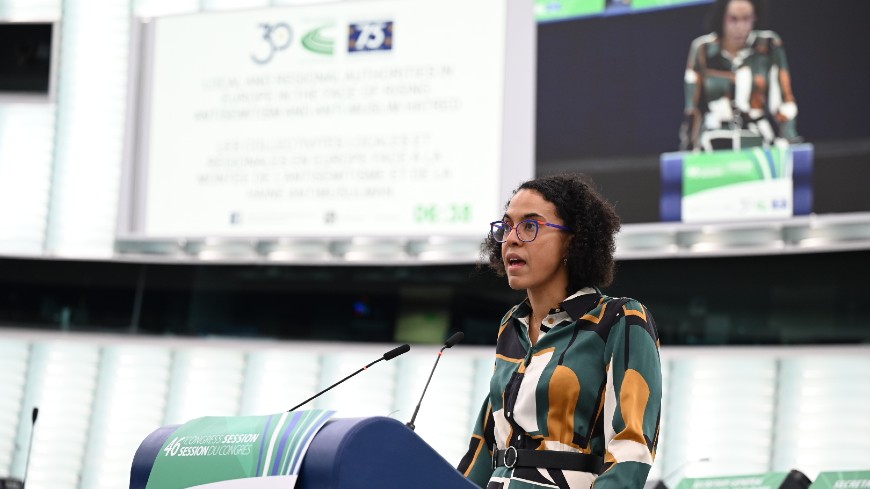
The events in the Middle East have led to an unprecedented upsurge in antisemitic and anti-Muslim incidents in Europe. During the thematic debate on 26 March, Congress members shared both recent information regarding their local authorities and also best practices for preventing violence and restoring intercultural dialogue on a lasting basis.
Local and regional authorities are once again on the front line when it comes to addressing daily risks of violence. Social and cultural peace is currently under greater strain than ever in major European cities in which various religious and cultural communities live side by side.
Kaya Comer-Schwartz, Council Leader in Islington, one of the most disadvantaged boroughs in London, highlighted the decisive part which the local council plays in preserving peace and dialogue in an area where over 40% of residents were born outside the UK. As the first Black and Jewish woman to head Islington Council, she is particularly keen to promote respect between the Jewish and Muslim communities there against the background of the current crisis. Never give in to hatred was the approach she had already applied when an anti-Muslim terrorist incident left one person dead and 11 injured during Ramadan in 2017. At the time, the local council took action to prevent the risk of hatred escalating: “Instead of spreading bitterness, the incident further strengthened solidarity between communities in our area. We decided to share iftar – the fast-breaking meal – in public with the Muslim community on the streets of Islington, and we’re going to do that again shortly against the particularly sensitive background of the Israeli-Palestinian conflict. The attack on the illuminations we put up for the Jewish festival of Hanukkah last December also didn’t deter us from repairing the installation the next day through the joint efforts of the representatives of the various communities in our area,” she said. The aim of the policies pursued by Islington Council was to create shared spaces of safety and trust, as dialogue was the only remedy for fear and ignorance.
“In many countries at present, Jews are preparing to leave Europe, and that demands an urgent response,” said Evein Obulor, Director of the European Coalition of Cities against Racism (ECCAR). However, an effective response to rising antisemitism and anti-Muslim hatred required structured approaches and tools capable of measuring the progress of policies implemented by local and regional authorities. ECCAR, which brought together 150 towns and municipalities, therefore offered its members practical roadmaps and toolboxes. Arranging partnerships and cultural events where different communities could share their religious ceremonies in the urban public arena could also help to create spaces of trust and intercommunity dialogue. Through examples of cities such as Heidelberg, Frankfurt and Stockholm, Ms Obulor illustrated the need also to involve representatives of civil society and religious institutions. As stressed by a large number of participants in the debate, specific education was also needed to train the young and old alike to respect and take an interest in the habits and customs of other groups.
Bertil Cottier, President of the European Commission against Racism and Intolerance (ECRI), said that the commission had already sounded the alarm in December and called on European governments to introduce emergency policies to combat the rise in antisemitism and anti-Muslim hatred. Citing ECRI’s reports on Poland and Austria which highlight good practice in this area, he also recalled ECRI’s policy recommendations with a particular focus on Holocaust memorial policies and the prevention of any stigmatization of Muslim officials in administrations. In conclusion, he said that “general indifference is even more dangerous than acts of aggression,” and called for massive involvement of local and regional authorities to combat cultural and religious racism.
Expressing concern at the rise in the far right in many European countries, the Congress representatives underlined the importance of quickly proposing practical solutions in response to those put forward by antidemocratic forces. Referring to the example of the centuries-old coexistence between Muslims, Jews and Christians in his country, the youth delegate from Bosnia and Herzegovina, urged his elders to do their utmost to preserve peace between communities and thereby save nothing less than “Europe’s soul.”
****
46th Session
Agenda – Web file – Photos
- Diminuer la taille du texte
- Augmenter la taille du texte
- Imprimer la page
Sviatlana Tsikhanouskaya asks the Congress to support democracy in her country
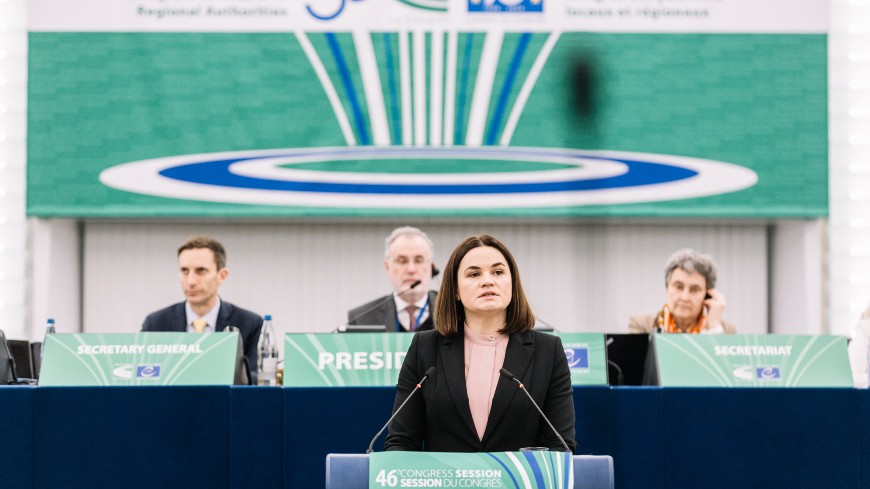
The goal of the Belarusian democratic forces was to decentralise governance and foster greater empowerment and autonomy within local communities, stressed Leader of the Belarusian democratic forces Sviatlana Tsikhanouskaya addressing the Congress session on 27 March 2024.
Convinced that the Congress could play a role in supporting Belarus’ joining European institutions, she asked Congress members to help to prepare the reform of self-governance, launch rehabilitation programmes for children of repressed and former political prisoners, organise scholarships and internships for Belarusians, and endorse the European perspective for Belarus, Ukraine and the Republic of Moldova.
Ms Tsikhanouskaya called on the Congress, mayors and local government leaders to become part of a broad international coalition for the integration of Belarus into democratic Europe. ”We cannot make the change in isolation from the rest of Europe,” she said, adding that ”for the people of Belarus, the road to Europe goes through Strasbourg”.
In the debate following her statement, Congress members praised her courage in the fight for democracy in her country, and expressed their solidarity with the people of Belarus and commitment to support democracy in that country.
***
- Diminuer la taille du texte
- Augmenter la taille du texte
- Imprimer la page
Congress President: Local and regional authorities can usefully contribute to the execution of Court judgments
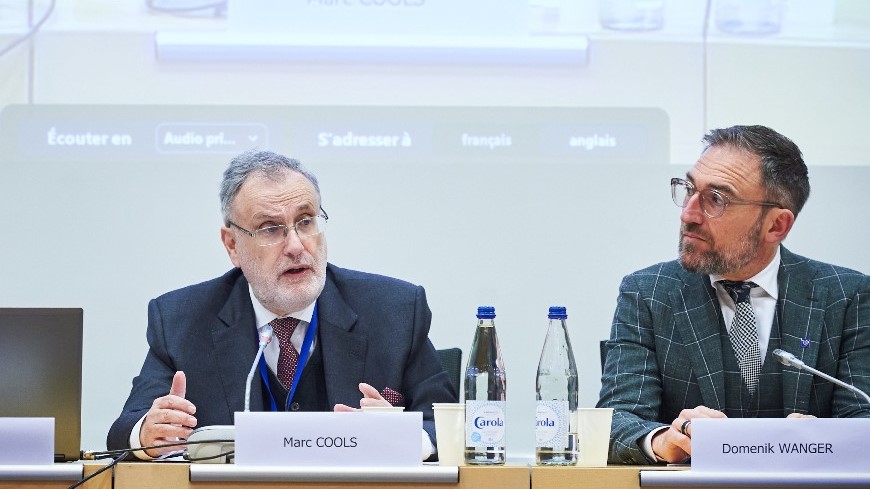
“Local and regional authorities can make a valuable contribution to the execution of judgments of the European Court of Human Rights on involuntary detention and treatment for mental health reasons”, stressed Congress President Marc Cools, speaking on 27 March 2024 at the Conference on "Of Unsound Mind".
The President stressed that local and regional authorities can offer relevant alternatives to avoid the internment of people suffering from mental health disorders, and enable them to remain in their communities. In this regard, he highlighted "the absolute necessity of raising awareness of human rights and fundamental freedoms among local and regional elected representatives and their administrations, on the one hand, to prevent placement decisions leading to a violation of Article 5 of the Convention, and on the other, to bring local elected representatives face to face with their responsibilities when it comes to the deplorable conditions of establishments for which they are responsible for management or control, and in which treatment and care are delivered."
The President also underlined that in order to remedy these situations, local and regional authorities must have adequate skills, training and financial resources. For its part, the Congress is fully committed to strengthening the role of local and regional authorities, both in enforcing the judgments of the Court, and in developing a better level of prevention in the treatment of people suffering from mental health disorders at local or regional level.
***
- Diminuer la taille du texte
- Augmenter la taille du texte
- Imprimer la page
Local self-government: France must pursue decentralisation and clarify division of powers, says Council of Europe Congress
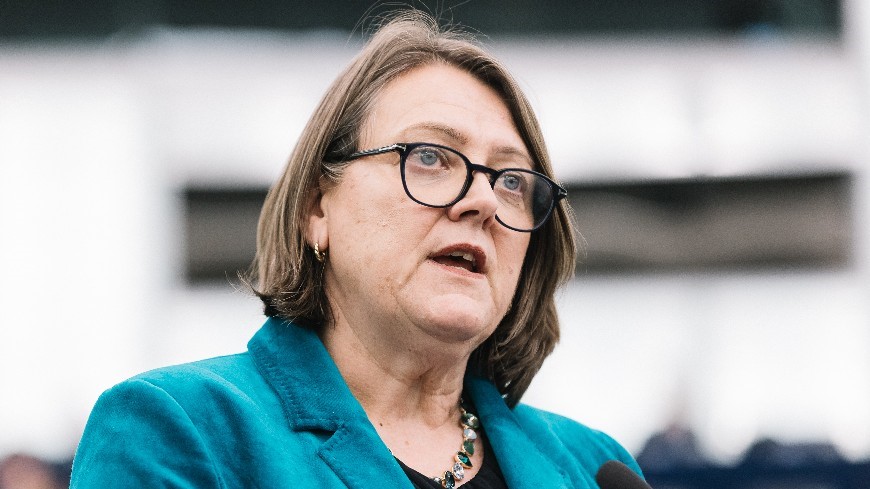
The Council of Europe Congress of Local and Regional Authorities has called on France to pursue decentralisation, clarify the division of powers between the state and subnational authorities and provide better protection for mayors.
Adopting its recommendation based on a report by Bryony Rudkin (United Kingdom, L, SOC/G/PD) and Matija Kovac (Serbia, R, EPP/CCE), after their visits in 2023 to monitor implementation of the European Charter of Local Self-Government, the Congress welcomed France’s planned decentralisation reforms, the general clause of competence enjoyed by municipalities, France’s ratification of the Charter’s Additional protocol on the right to participate in the affairs of a local authority, the granting of special status to Paris in 2019 and the frequent references to the Charter in legal proceedings relating to local or regional governance.
The report underlined certain points that deserve particular attention, especially the incomplete decentralisation mentioned in the Court of Auditors’ 2023 annual public report; unclear distribution of powers; over-regulation of powers delegated to local authorities, and a gradual reduction in local taxation leading to excessive centralisation of local authority funding.
Local authorities lacked proportional funding from central government, were increasingly dependent on subsidies and contractual funding and consultation mechanisms were mainly used as channels for informing local and regional authorities of central government initiatives, plans and regulations, the report said. It also expressed concern at the increasing threats and attacks against mayors and local elected representatives from society at large, often via social networks, jeopardising democratic local governance. National authorities needed to strengthen legal protection of mayors and extend limitation periods in criminal matters.
The Congress called for the recently announced decentralisation reforms to be pursued and for division of power to be clarified, with over-regulation avoided. Fiscal autonomy should be strengthened and the costs of exercising delegated powers should be periodically reviewed to ensure that they are proportionately financed. It also stressed the importance of reducing local authorities’ dependence on contractual funding and central transfers, while implementing genuine consultation mechanisms.
The debate was followed by an exchange of views with Dominique Faure, French Minister with responsibility for Local Government and Rural Affairs, who then participated in a round table on the occasion of the 30th anniversary of the Congress.
Contact: Estelle Steiner, Spokesperson/Press officer, Tel. +33 3 88 41 33 35
***
- Diminuer la taille du texte
- Augmenter la taille du texte
- Imprimer la page
Congress committees: last meetings under the current terms of references
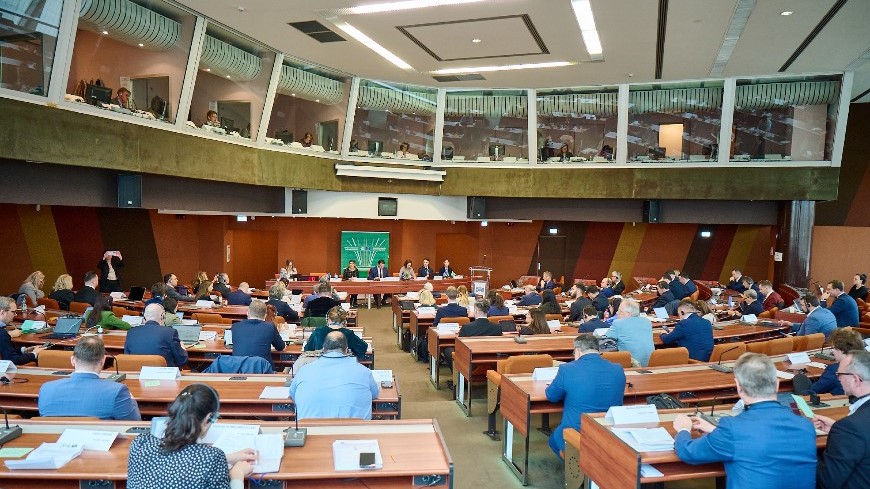
The three statutory committees of Congress held their last meetings on 26 March under the current terms of reference.
The Monitoring Committee approved a report on the application of the European Charter of Local Self-Government in Malta as well as the terms of reference for a report on foreign interference during electoral processes at local and regional levels. The Governance Committee discussed the preparation of reports on circular economy and on freshwater resources under stress. The Current Affairs Committee approved the terms of reference for reports on the role of local and regional authorities in combatting trafficking of human beings and on the revision of the European Charter on the Participation of Young People in local and regional life.
Under the new terms of reference adopted by the Congress the same day as part of the revision of its Rules of Procedure to reflect the decisions of the Reykjavik Summit, the three committees will be reconstituted as, respectively, the Committee on the Monitoring of the implementation of the European Charter of Local Self-Government and on the respect of Human Rights and the Rule of Law at local and regional levels (“the Monitoring Committee”); the Committee on Governance, Civic Engagement and the Environment (“the Governance Committee”); and the Committee on Social Inclusion and Human Dignity (“the Social Inclusion Committee”).
***
- Diminuer la taille du texte
- Augmenter la taille du texte
- Imprimer la page
Congress calls for greater involvement of local and regional authorities in strengthening the rule of law
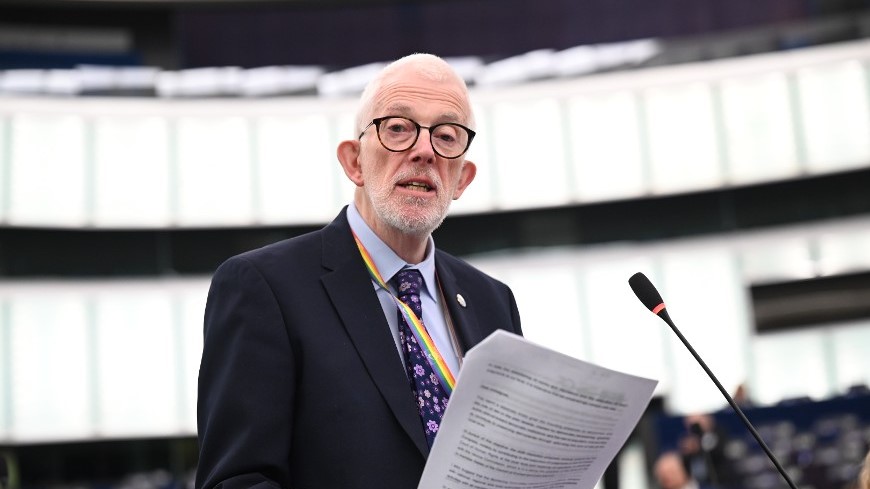
“To help sustain democracies, the rule of law must be respected also at local level,” stressed Congress Rapporteur Stewart Dickson (United Kingdom, R, ILDG) presenting his report on “Local and Regional Authorities as Actors and Guarantors of the Rule of Law” at the Congress session on 26 March. “Respecting the rule of law means that citizens democratically and freely elect their leaders, that laws are uniformly applied by all state institutions, and that no one is above the law, and no citizen is discriminated against or left behind,” he stressed.
Upholding the rule of law as one of the fundamental pillars of the Council of Europe was of great importance for local and regional elected representatives who can thus contribute to strengthening democracy and human rights, explained the rapporteur, proposing to this end several actions by the Congress – such as contribution to implementing at local level the judgments of the European Court of Human Rights and promoting co-operation on the matter, in particular with the Council of Europe’s Venice Commission. Mr Dickson also proposed to pursue political dialogue with national, regional and local authorities of all member States concerned by an erosion of the rule of law in the framework of Congress post-monitoring activities.
Following a particularly lively debate, Congress members supported the rapporteur’s proposal by adopting unanimously a resolution and a recommendation inviting member States to comply with the European Charter of Local Self-Government and implement Congress recommendations in order to guarantee good democratic governance. Congress monitoring reports should serve as early warnings to prevent or address worrying developments with regard to member States' compliance with democratic standards and practices. Member States were also encouraged to include local authorities in promoting the rule of law by enforcing the judgements of the European Court of Human Rights at local level.
***
- Diminuer la taille du texte
- Augmenter la taille du texte
- Imprimer la page
Montenegro’s reforms welcomed, but worrying trend to centralisation must be reversed, Congress says
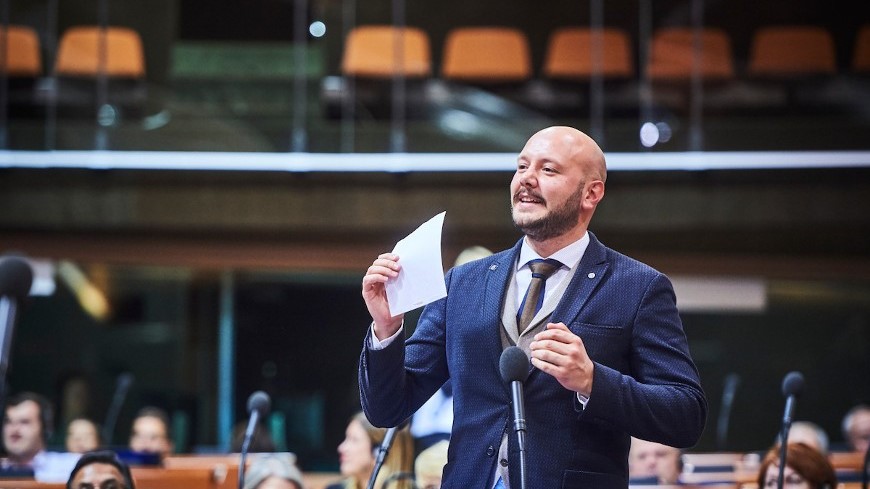
The Council of Europe Congress of Local and Regional Authorities has called on Montenegro to reverse a trend to centralise local government and to improve consultation procedures, especially on financial matters, while providing adequate funding for municipalities.
In its recommendation based on a report by Cemal Bas (Türkiye, L, EPP/CCE) and Sören Schumacher (Germany, R, SOC/G/PD) following their 2023 visit to monitor implementation of the European Charter of Local Self-Government the Congress acknowledged strategic initiatives taken by Montenegro to reform the public administration, with a declared focus on decentralisation and digitalisation, such as the Public Administration Reform Strategy 2022-2026. It also welcomed the positive practice of minority language use in the execution of local public functions in municipalities where the majority of the population belongs to ethnic minorities, and the Union of Municipalities of Montenegro's right to apply directly to the Constitutional Court.
However, the rapporteurs expressed concerns about the overall trend towards recentralisation of local competencies, including in the essential area of spatial planning, and restricted financial autonomy at the local level. Smaller municipalities lacked the financial capacity to ensure the high-quality performance of their functions, while the share of tax revenue for most municipalities was diminished following the enactment of the 2021 Law on Personal Income Tax, also known as the “Europe Now” programme.
Furthermore, municipalities had to receive authorisation from the central level to perform some municipal functions and had little room to adapt local responsibilities to local needs due to an overregulation of competences – coupled with considerable shortcomings in the consultation process, including on financial matters and with regard to municipal boundary changes.
The Congress invited Montenegro to resume decentralisation efforts and pursue the declared local self-government reform in consultation with municipalities and the Union of Municipalities of Montenegro. In general, local authorities should be consulted systematically and effectively, particularly through the Union of Municipalities, on all matters that concern them, the Congress said. The rapporteurs also suggested strengthening local fiscal autonomy, ensuring that task assignments come with commensurate resources, and making sure that local authorities can exercise their own competences without ministerial approval.
Press contact: Tatiana Baeva-Frachon, Media Officer, Directorate of Communications, Council of Europe, tel. +33 6 85 11 64 93
***
- Diminuer la taille du texte
- Augmenter la taille du texte
- Imprimer la page
Andorra is fully committed to local self-government, concludes Council of Europe Congress
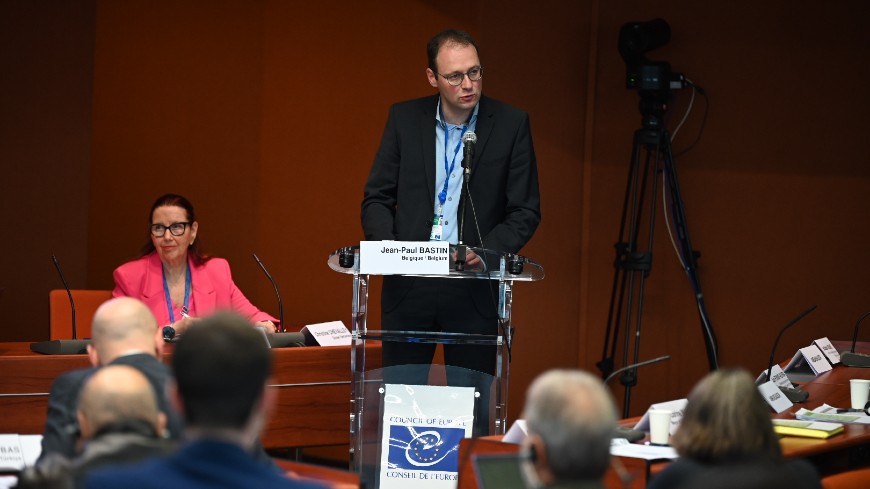
The Principality of Andorra seems to support local self-government fully and the level of local democracy in the country is generally satisfactory, concluded the Congress of Local and Regional Authorities of the Council of Europe in a recommendation adopted during its 46th plenary session.
The recommendation was based on the findings of a monitoring report on the application of the European Charter of Local Self-Government in Andorra, prepared by Jean-Paul Bastin (Belgium, L, EPP/CCE) and Christine Chevalley (Switzerland, L, ILDG).
The Congress acknowledged that Andorran municipalities had very broad powers and satisfactory human and financial resources, and that there was a culture of close consultation between the state and local authorities, stemming from long-standing traditions and facilitated by the country´s small dimension. The Constitution guarantees parishes autonomy, which is reflected in the composition of the Andorran Parliament (Consell General), where municipalities are directly represented.
The Congress pointed out several areas where there was room for improvement. It recommended that the country adopt legislation governing consultation and negotiation procedures between national and local authorities as well as granting specific autonomy to the capital, Andorra la Vella, to take into account its particular situation compared to the other municipalities.
The Congress also invited Andorra to sign and ratify the Additional Protocol to the European Charter of Self-Government on the right to participate in the affairs of a local authority. In this regard, the rapporteurs noted with satisfaction that this was one of Andorra’s current priorities.
Finally, the Congress encouraged Andorra to ratify two articles of the Charter, despite the fact they are already applied in practice: Article 9.2, which requires that local authorities are provided with adequate financial resources to perform their functions; and Article 9.5 on the principle of financial solidarity to prevent the unequal distribution of resources to local administrations.
On the occasion of the debate, Ladislau Baró, Minister of Institutional Relations, Education and Universities of Andorra, addressed a video message to the Congress.
Andorra ratified the European Charter of Local Self-Government on 23 March 2011.
****
- Diminuer la taille du texte
- Augmenter la taille du texte
- Imprimer la page
Council of Europe Congress welcomes incorporation of local democracy and self-government principles into Norwegian law
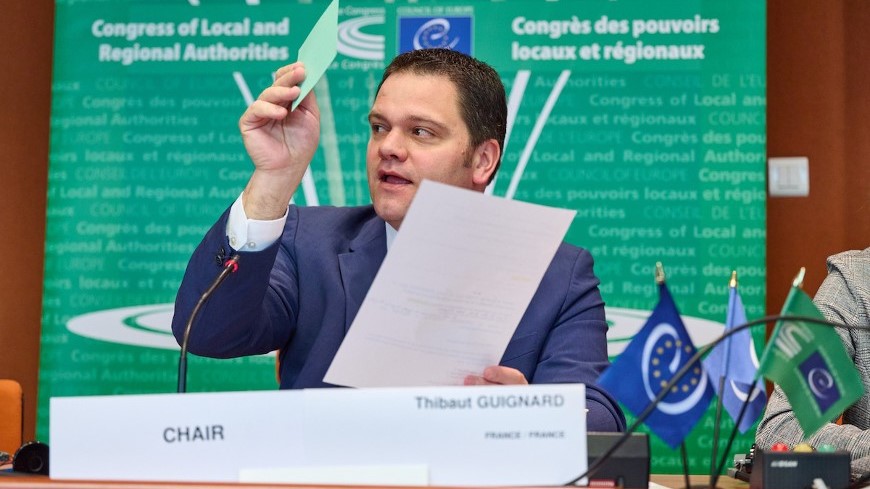
The Congress of Local and Regional Authorities of the Council of Europe has concluded that Norway’s system of local self-government worked well, but expressed its concern over the unclear procedure of consultation of local communities on changes concerning their boundaries, and the still pervasive degree of their supervision by the government.
These are the main conclusions of the third recommendation evaluating the implementation of the European Charter of Local Self-Government in Norway, based on a report by Thibaut Guignard (France, L, EPP/CCE) and Carla Dejonghe (Belgium, R, ILDG). The Congress noted with satisfaction the high degree of compliance with the Charter and the incorporation of the principles of local democracy and self-government in the Constitution and legislation. The rapporteurs also welcomed the introduction of judicial remedies for local authorities against decisions taken by the State administration.
The report recommends that national authorities further strengthen local self-government by avoiding legislation too dense and specific, and clarify the procedure of consultation on changes of local authorities’ boundaries as well as the scope of the State supervision of local self-government so that it remains proportionate to the interests it seeks to protect.
The recommendation was adopted during the 46th Session of the Congress, following a debate which included a statement by Ole Gustav Narud, Secretary of State for the Ministry of Local Government and Regional Development of Norway.
****
46th Session
Agenda – Web file – Photos
- Diminuer la taille du texte
- Augmenter la taille du texte
- Imprimer la page
Congress members committed to protecting the rights of the children of Ukraine
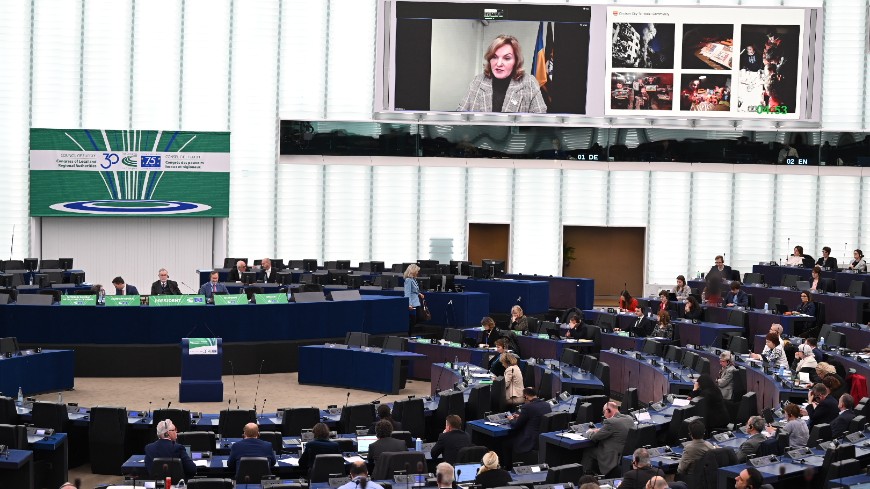
The situation of the children of Ukraine was at the heart of the debate of Congress members on Tuesday 26 March.
Daria Herasymchuk, Presidential Commissioner for Children’s Rights and Child Rehabilitation, detailed the disruption to children’s rights to safety, health, and education caused by the war of aggression of the Russian Federation against Ukraine. She stressed that only reported crimes could be investigated, and that the real scale of children’s rights violations remains unknown. She therefore called on local and regional authorities across Europe to support the work of Ukrainian national authorities and UN bodies in reporting and documenting violations of the UN Convention on the Rights of the Child and, in particular, in identifying children abducted and forcibly deported by the Russian Federation.
Congress members heard a poignant testimony from Galyna Minayeva, Mayor of Chuhuiv from the Kharkiv Region of Ukraine. Her city, like too many other municipalities in Ukraine, was suffering from repeated shelling caused by the Russian Federation, said Mayor Minayeva. She detailed the specific measures put in place by her local authority to cater to the needs of the children remaining in her community. This included providing emergency mobile psychosocial services to children and their caregivers, supporting teachers in delivering psycho-emotional relief through art classes and sports clubs, and rehabilitating infrastructures to ensure children’s safety. She called on Congress members to continue supporting local and regional authorities in Ukraine. “Adults start wars, and children suffer the most. We, as adults, must do everything we can to preserve the mental and physical health of every child,” she concluded.
Co-rapporteurs Gunn-Marit Helgesen (Norway, R, EPP/CCE) and Martine Dieschburg-Nickels (Luxembourg, L, ILDG) reiterated the Congress’ solidarity with Ukraine and urged Congress members to make full use of the Cities4Cities Platform, which aims to connect Ukrainian and other European municipalities to build strong partnerships and support the country’s post-war recovery.
***
- Diminuer la taille du texte
- Augmenter la taille du texte
- Imprimer la page
Two years of war: Council of Europe Congress calls for greater support to Ukraine
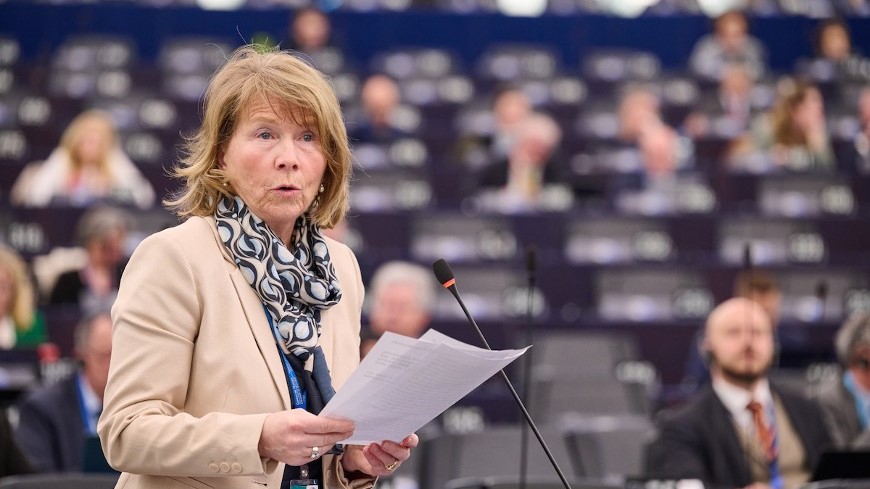
The Congress of Local and Regional Authorities of the Council of Europe adopted on 26 March 2024 a Declaration on thesecond anniversary of the Russian Federation’s war against Ukraine, presented by Martine Dieschburg-Nickels (Luxembourg, L, ILDG) and Gunn-Marit Helgesen (Norway, R, EPP/CCE).
The Congress reiterated its condemnation of the ongoing war of aggression against Ukraine and reaffirmed its unwavering commitment to the independence, sovereignty, and territorial integrity of Ukraine within its internationally recognised borders.
In the two years since it was launched, this brutal war has caused the loss of tens of thousands of innocent lives as well as massive destruction throughout Ukraine, forcing millions of people to flee their homes and spreading violence and disinformation, with dramatic long-term repercussions on cities and communities in Ukraine and worldwide.
The Congress highlighted the critical importance of seeking justice for victims and holding Russia accountable and welcomed the establishment of the Register of Damage for Ukraine, whose action it will support by making sure claims can be taken swiftly including through local and regional authorities.
In its Declaration, the Congress again joined the international community’s call for the Russian Federation to end its unjustified and unprovoked war against Ukraine and withdraw its troops from the territory of Ukraine immediately, fully and unconditionally, and condemned the horrific war crimes as well as acts of possible genocide that have been committed by Russian forces.
The Congress deplored in particular the impact of the war on the children of Ukraine, including those who have been internally displaced, forced to flee Ukraine, separated from their families and/or forcibly deported by the Russian authorities, and called on local and regional authorities where these children are presently living to take comprehensive action to protect them.
The Declaration also condemned the illegal conduct of so-called elections by the Russian Federation in regions within the internationally recognised borders of Ukraine in autumn 2023 and of the Russian presidential elections in March 2024 in the temporarily occupied regions of Ukraine, and emphasised that such actions, which are in flagrant breach of international law, undermine international peace and security and violate the right of citizens to participate in the conduct of local affairs.
The Congress reiterated its solidarity with Ukrainian citizens and their elected leaders, who continue to demonstrate extraordinary courage and resilience in defending their country against the aggressor State, and called on European cities and regions to continue providing large-scale financial, security and humanitarian assistance to their Ukrainian counterparts, including through possible direct, multi-faceted partnerships.
The Declaration commended the solidarity and unity of Europeans and their cities and municipalities, which have welcomed millions of people fleeing the war against Ukraine and provided assistance and support to meet their needs from the outset of the full-scale aggression, and called for this support to be maintained and increased in order to help Ukraine to defend itself and its people.
The Congress expressed its support for Ukraine’s reform efforts as part of its request for accession to the European Union as well as its firm belief that Ukraine’s decentralisation and local self-government reform significantly contributes to its resilience at local and regional levels, and underlined the importance of pursuing the reform process during the post-war recovery. The Congress will continue to provide its support in these efforts through the large number of its co-operation projects in Ukraine.
Congress members reiterated that they stand by the Ukrainian people at this historically decisive time for Ukraine and the world and believe in a common, democratic future based on respect for international law and a just peace.
***
- Diminuer la taille du texte
- Augmenter la taille du texte
- Imprimer la page
Council of Europe Congress calls for legal recognition of the European Charter of Local Self-Government in Italy
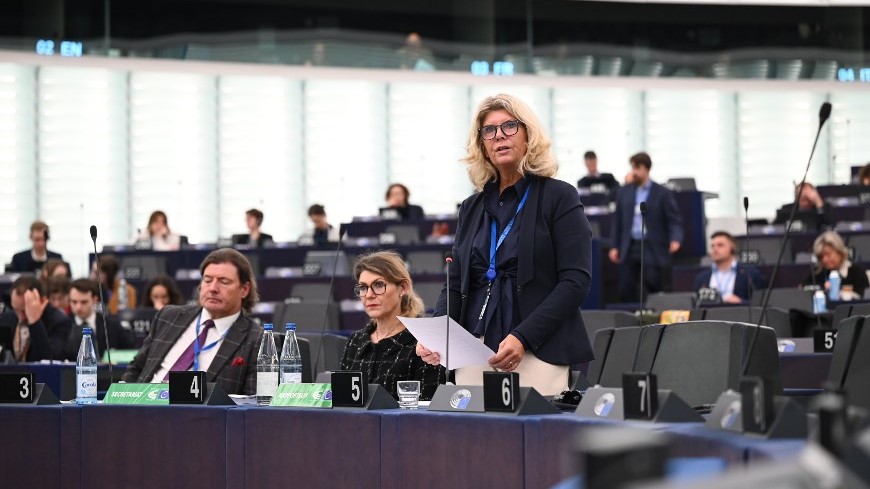
The Council of Europe Congress of Local and Regional Authorities has called on Italy to reconsider the legal force of the European Charter of Local Self-Government so that local authorities can benefit fully from its protection, noting the current absence of the Charter’s legal recognition by the Constitutional Court.
In its recommendation based on a report by Andrew Leadbetter (United Kingdom, L, ECR) and Randi Mondorf (Denmark, R, ILDG), the Congress noted with satisfaction increasing local and regional revenues, improved consultation processes and equalisation system, and work to develop the legal basis for the re-introduction of direct elections in provinces, as well as Italy’s ratification of the Additional Protocol to the Charter on the right to participate in the affairs of a local authority.
However, the rapporteurs pointed out some aspects deserving particular attention, such as the limited scope of action of metropolitan cities and provinces, the lack of adequate and commensurate resources for provinces, and the impossibility for provincial and metropolitan councils to formulate a vote of dismissal or no confidence against their leaderships. Additionally, the report underlined the absence of a system of fair and adequate remuneration for representatives of provinces and metropolitan cities, the persisting shortage of staff in local and regional authorities, and the existing threats and violence against elected representatives. Furthermore, the rapporteurs recommended modernising the system of governance for the metropolitan area of the capital city Rome suffering from the fragmentation of municipal structures and the persistent lack of co-ordination, through developing collaborative forms of metropolitan governance with various stakeholders.
The Congress invited Italy to widen the scope of action of metropolitan cities and provinces, following the re-introduction of directly elected bodies, and to ensure fair and appropriate remuneration to elected representatives of provinces and metropolitan cities. The rapporteurs also recommend introducing a mechanism that strengthens legal action and extends the statute of limitations to provide better protection under criminal law for elected representatives who are subject to attacks and aggression. Finally, the implementation of additional measures to enhance the capacity of local and regional governments in hiring highly qualified staff was recommended.
Moreover, the rapporteurs welcomed the ongoing debate in Italy on the concept of “differentiated autonomy” aimed at reducing the gap in resources between ordinary and special regions. “Our vision of how territorial autonomy should be articulated in Italy and the Council of Europe's idea of how relations between the different territorial levels should be articulated coincide in many respects because this is the correct vision of how regional and local autonomy should be realised,” emphasised in this regard Italian Minister for Regional Affairs and Autonomies Roberto Calderoli addressing the Congress session on-line. “In fact, there is no other way if we want to have more democratic countries and more efficient institutions, where decisions, implementing the principle of subsidiarity, are taken as close as possible to the citizens,” he added.
***
46th Session
Agenda – Web file – Photos
- Diminuer la taille du texte
- Augmenter la taille du texte
- Imprimer la page
Commissioner for Human Rights: Deterioration of human rights is most evident in the area of migration
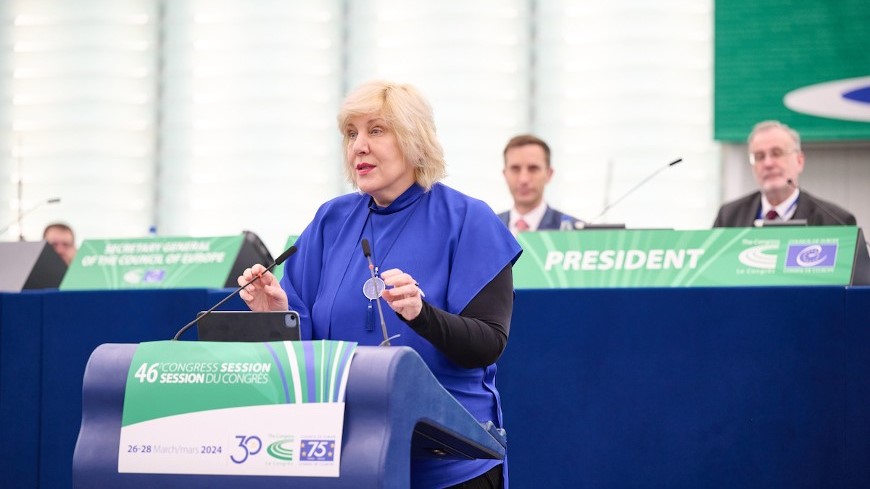
In her statement at the Congress session, Dunja Mijatović, Council of Europe Commissioner for Human Rights, took stock her six-year mandate, stressing that she had “witnessed a marked deterioration in people’s ability to enjoy their human rights.”
COVID-19 pandemic, Russia’s invasion of Ukraine, conflict between Armenia and Azerbaijan over the Karabakh region were just some examples of the erosion of the rule law and violations of human rights mentioned by the Commissioner. She also pointed to cases of such erosion at local level, such as politically motivated arrests of mayors or local councillors or the unjustified banning of candidates from participating in elections.
According to her, one of the major concerns was the fact that even local authorities sometimes ignored international human rights standards and took measures that contradicted their legal obligations.
“The erosion of the rule of law is most evident in the area of migration, where practices that undermine the dignity and rights of individuals are increasingly common. Pushbacks, inadequate responses to maritime tragedies, inhumane reception conditions and restrictive family reunification policies, while not new, are now occurring with alarming regularity and intensity,” stressed the Commissioner.
She highlighted in particular a decline in respect for basic legal principles in the treatment of refugees and asylum seekers. Nevertheless, during her mandate and visits to countries, the Commissioner witnessed the efforts of officials, including at the local and regional level, to defend human rights, often at great personal risk.
Full speech of the Commissioner for Human Rights
***
- Diminuer la taille du texte
- Augmenter la taille du texte
- Imprimer la page
Secretary General marks Council of Europe 75th anniversary at Congress session
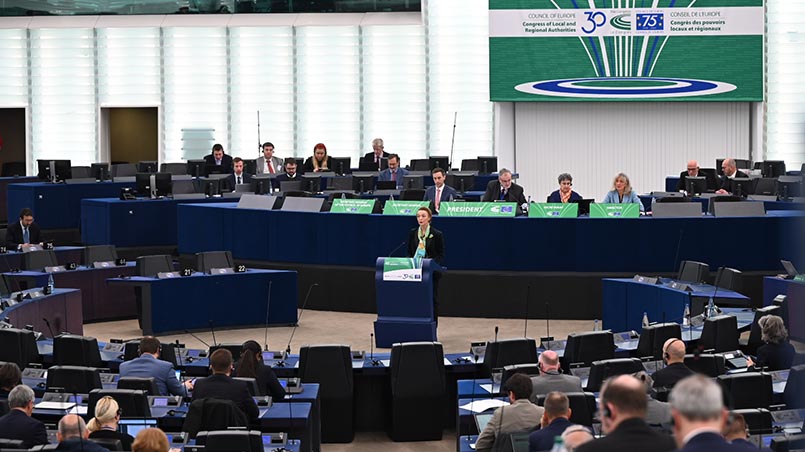
Secretary General Marija Pejčinović Burić has marked the importance of the Council of Europe 75th anniversary in her speech at the Congress of Local and Regional Authorities session, coinciding with its 30th anniversary and the 10th anniversary of its youth initiative.
“I am very pleased with the recent strengthening of the Congress and its activities, following the Reykjavík Summit and Declaration last May. This strengthening is linked to the progress made through administrative reform and the adoption of the programme and budget last December, which led to a real increase in resources for the Congress’ statutory observation and monitoring activities”, highlighted the Secretary General.
Marija Pejčinović Burić also took stock of her term of office, with the emphasis on her main achievements.
“I would like to express my support to the President of the Congress for the smooth running of his mandate and underline the importance of his statements on violence against locally elected representatives, which cannot be tolerated under any circumstances and cannot go unpunished. We must remain united in our commitment to the protection of fundamental rights and the promotion of democracy at all levels of governance. The rule of law is our compass, guiding our actions and decisions for a future based on justice and equality”, she concluded.
Full speech of the Secretary General of the Council of Europe
Statement by the Secretary General of the Council of Europe
***
- Diminuer la taille du texte
- Augmenter la taille du texte
- Imprimer la page
Young Ukrainian musicians play at the opening of the 46th Congress session
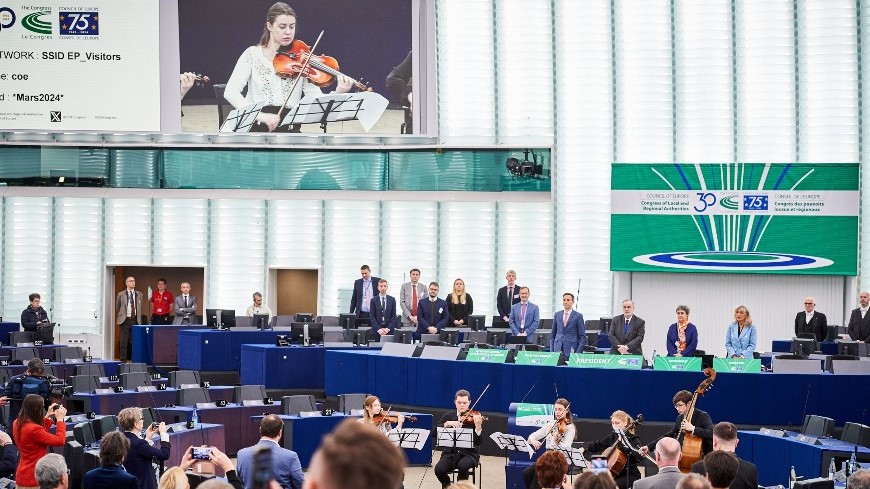
The 46th session of the Congress opened in Strasbourg today to the sound of the European and Ukrainian anthems played young musicians from Ukraine.
The 3-day session’s agenda features debates on two years of the Russian Federation's war against Ukraine, with the adoption of a declaration, and on the role of local and regional authorities in protecting the rights of children of Ukraine, with the participation of Daria Herasymchuk, Presidential Commissioner for Children’s Rights and Child Rehabilitation. Congress members will also hold an exchange of views with Sviatlana Tsikhanouskaya, Leader of Belarusian democratic forces, during a debate on the role of local and regional authorities in supporting them. the Congress will hold a special ceremony on Wednesday 27 March to mark its 30th anniversary.
The Congress will debate monitoring reports on the application of the European Charter of Local Self-Government in Andorra, Croatia, France, Italy, Montenegro and Norway, as well as on the observation of local elections in the Republic of Moldova (5 November 2023). Resolutions and recommendations on local and regional authorities as actors and guarantors of the rule of law, local and regional responses to natural disasters and climate hazards: from risk preparedness to resilience, and the UN Summit of the Future will also be discussed and voted on.
Rising antisemitism and anti-Muslim hatred in Europe, local responsibilities in environmental protection, the right to water under threat, exodus of services from peripheral and rural regions, intercultural regions and the draft convention on artificial intelligence are among other themes of session debates. Congress members will also exchange views with Council of Europe Secretary General Marija Pejčinović-Burić and Council of Europe Commissioner for Human Rights Dunja Mijatović, who will present the results of their respective terms of office, as well as with Deputy Prime Minister of Liechtenstein Sabine Monauni on behalf of her country’s Committee of Ministers Presidency.
Among other invited guests are Minister for Regional Affairs and Autonomies of Italy Roberto Calderoli; Minister with responsibility for Local Government and Rural Affairs of France Dominique Faure; Secretary of State for the Ministry of Local Government and Regional Development of Norway Ole Gustav Narud; President of the European Committee of the Regions of the EU Vasco Alves Cordeiro; Minister for Interior and Sports of the State of Lower Saxony (Germany) Daniela Behrens; Chair of the European Commission against Racism and Intolerance (ECRI) Bertil Cottier; as well as Mayor of Zürich (Switzerland) Corine Mauch, Mayor of Reykjavík (Iceland) Einar Þorsteinsson, Mayor Valongo (Portugal) José Manuel Ribeiro, Deputy Mayor of Paris (France) Arnaud Ngatcha and Deputy Mayor of Nikopol (Ukraine) Tetiana Obydenna.
30th Anniversary of the Congress programme
****
- Diminuer la taille du texte
- Augmenter la taille du texte
- Imprimer la page
Congress welcomes recommendations of the European Alliance of Cities and Regions for the Reconstruction of Ukraine
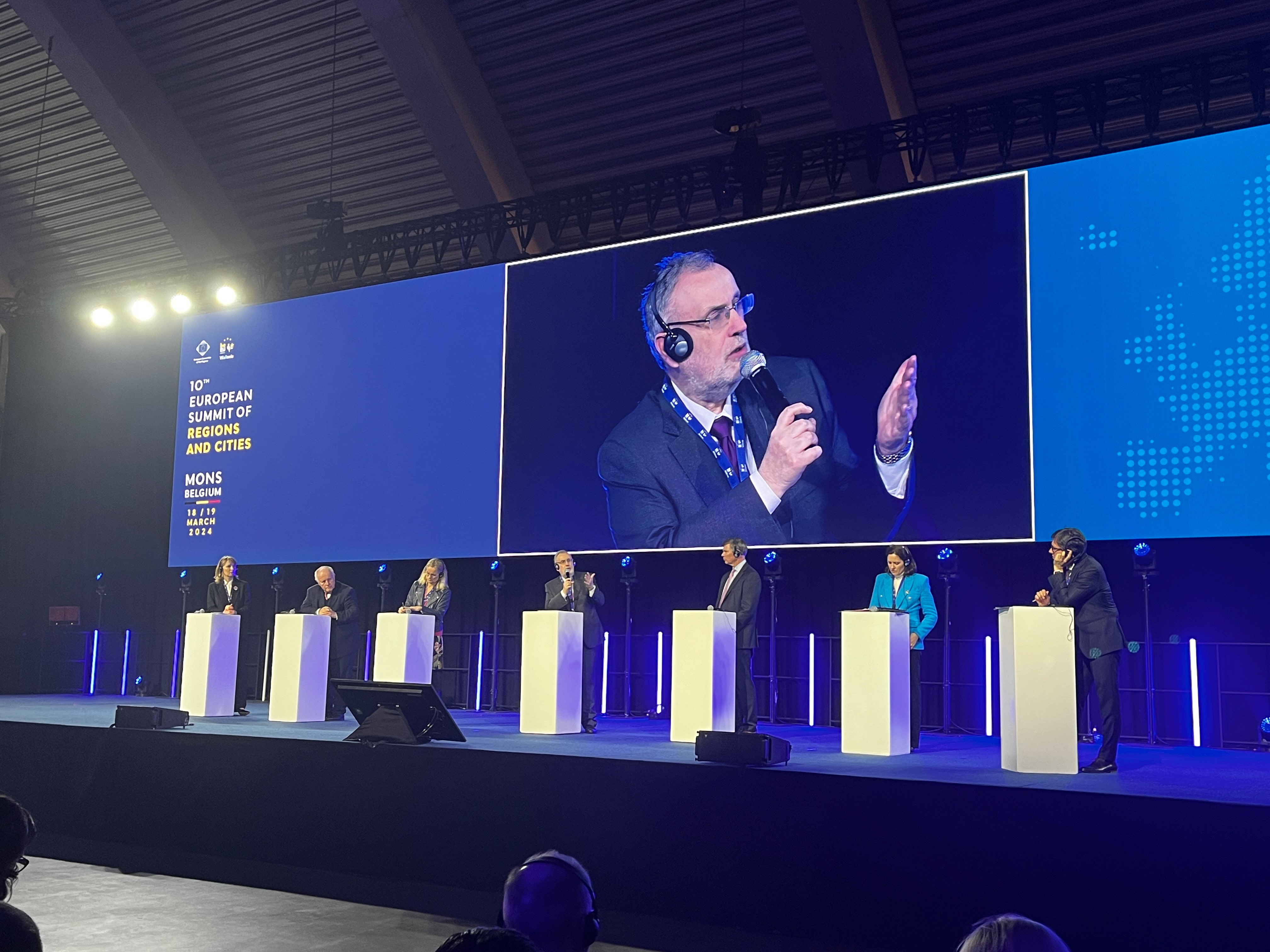
Addressing the European Alliance of Cities and Regions for the Reconstruction of Ukraine , in Mons (Belgium) on 19 March 2024, Congress President Marc Cools reiterated the Congress’ continuous support to Ukraine, and called for a decentralised approach to its recovery, in line with the principles of the European Charter of Local Self-Government. “Local authorities know the needs, challenges, and potential of their territory. Let us give them the means to fully participate in the decision-making process on all issues that directly concern them,” he underlined.
President Cools participated in the high-level political panel dedicated to the reconstruction of Ukraine, on the occasion of the 10th European Summit of Regions and Cities, organised by the European Committee of the Regions.
As an institutional partner of the European Alliance, the Congress contributed to drafting a set of 17 recommendations presented ahead of the Ukraine Recovery Conference (Berlin, 11-12 June 2024). The recommendations stress the key role local and regional authorities play in the country’s reconstruction and the need for their systematic involvement in the recovery processes, along with a clearer definition of their powers, responsibilities and resources in Ukraine.
Further information:
Recommendations to the Ukraine Recovery Conference 2024 for a decentralised recovery and reconstruction of Ukraine: full text of the declaration by the European Alliance of Cities and Regions for the Reconstruction of Ukraine, in English, Ukrainian, German, and French.
- Diminuer la taille du texte
- Augmenter la taille du texte
- Imprimer la page
Russia’s war against Ukraine, rising antisemitism and anti-Muslim hatred, support to Belarus democratic forces and 30th anniversary of the Congress among the themes of its 46th session
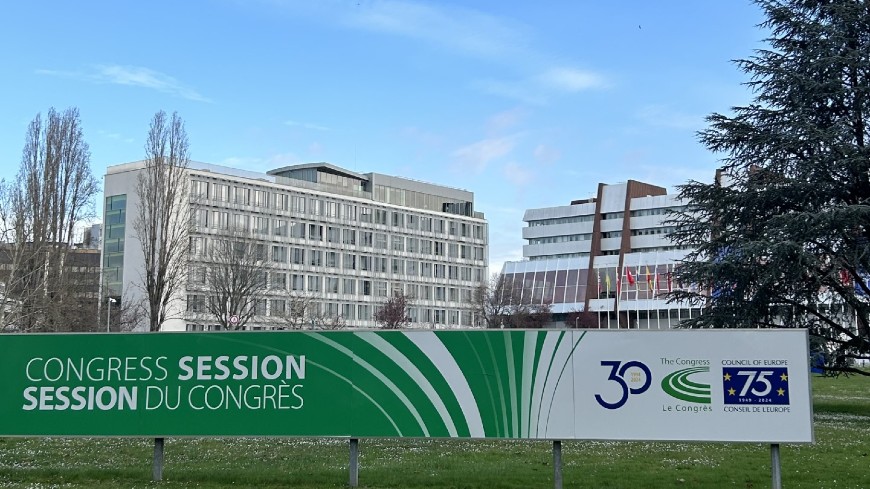
The Congress of Local and Regional Authorities of the Council of Europe will hold its 46th Session from 26 to 28 March 2024 in Strasbourg, France. On this occasion, the Congress will hold a special ceremony on Wednesday 27 March to mark its 30th anniversary.
The session’s agenda features debates on two years of the Russian Federation's war against Ukraine, with the adoption of a declaration, and on the role of local and regional authorities in protecting the rights of children of Ukraine, with the participation of Daria Herasymchuk, Presidential Commissioner for Children’s Rights and Child Rehabilitation. Congress members will also hold an exchange of views with Sviatlana Tsikhanouskaya, Leader of Belarusian democratic forces, during a debate on the role of local and regional authorities in supporting them.
The Congress will debate monitoring reports on the application of the European Charter of Local Self-Government in Andorra, Croatia, France, Italy, Montenegro and Norway, as well as on the observation of local elections in the Republic of Moldova (5 November 2023). Resolutions and recommendations on local and regional authorities as actors and guarantors of the rule of law, local and regional responses to natural disasters and climate hazards: from risk preparedness to resilience, and the UN Summit of the Future will also be discussed and voted on.
Rising antisemitism and anti-Muslim hatred in Europe, local responsibilities in environmental protection, the right to water under threat, exodus of services from peripheral and rural regions, intercultural regions and the draft convention on artificial intelligence are among other themes of session debates. Congress members will also exchange views with Council of Europe Secretary General Marija Pejčinović-Burić and Council of Europe Commissioner for Human Rights Dunja Mijatović, who will present the results of their respective terms of office, as well as with Deputy Prime Minister of Liechtenstein Sabine Monauni on behalf of her country’s Committee of Ministers Presidency.
Among other invited guests are Minister for Regional Affairs and Autonomies of Italy Roberto Calderoli; Secretary of State for the Ministry of Local Government and Regional Development of Norway Ole Gustav Narud; President of the European Committee of the Regions of the EU Vasco Alves Cordeiro; Minister for Interior and Sports of the State of Lower Saxony (Germany) Daniela Behrens; Chair of the European Commission against Racism and Intolerance (ECRI) Bertil Cottier; as well as Mayor of Zürich (Switzerland) Corine Mauch, Mayor of Reykjavík (Iceland) Einar Þorsteinsson, Mayor Valongo (Portugal) José Manuel Ribeiro, Deputy Mayor of Paris (France) Arnaud Ngatcha and Deputy Mayor of Nikopol (Ukraine) Tetiana Obydenna.
The Congress plenary session will be held in the building of the European Parliament in Strasbourg, and access to journalists to the venue will be limited.
The Congress session is open to media strictly upon prior accreditation. The deadline for applying for accreditation is Monday, 25 March 2024, 12h00 CET.
Mass media representatives will also be able to follow the Congress session live in English, French, German, Turkish, and Italian at https://www.coe.int/en/web/portal/home. Debates on the Russian Federation’s war against Ukraine and on the right to water under threat will also be interpreted into Ukrainian. Draft agenda and the Session’s documents as well as videos and photos are available on the Session’s dedicated page.
Contact: Tatiana Baeva-Frachon, Spokesperson/Media Officer, Directorate of Communications, Council of Europe
- Diminuer la taille du texte
- Augmenter la taille du texte
- Imprimer la page
Council of Europe Congress to observe local elections in Türkiye

A twenty-member delegation from the Congress of Local and Regional Authorities of the Council of Europe will carry out a mission from 29 March until 1 April to observe local elections in various regions of Türkiye held on 31 March 2024. The delegation will be accompanied by an expert and the secretariat.
Prior to the onsite deployment, the delegation, led by David Eray (Switzerland, EPP/CCE), held online meetings with members of the delegation of Türkiye to the Congress, representatives of the Radio and Television Supreme Council and of the Union of Municipalities of Türkiye, as well as with representatives of domestic NGOs and the media.
In the run-up to Election Day, the delegation will also hold exchanges in Ankara with various stakeholders, including national and local authorities, as well as with candidates and representatives of political parties running in the elections.
On Election Day, 12 Congress teams will be deployed to monitor the election procedures in polling stations, from opening to closing and counting, in different areas throughout the country.
A press conference presenting the findings of the delegation will take place on 1 April at 11:00 at the Hilton Hotel in Ankara (Kavaklıdere, Tahran Cd. No:12, 06700 Çankaya/Ankara). A press release will be published on the Congress website.
Congress Delegation:
Mr David ERAY, Switzerland, EPP/CCE, R, Head of Delegation
Mr Vladimir PREBILIC, Slovenia, SOC/G/PD, L, Deputy Head of Delegation
Mr Mathieu CUIP, France, EPP/CCE, R
Ms Dusica DAVIDOVIC, Serbia, SOC/G/PD, R
Ms Carla DEJONGHE, Belgium, ILDG, R
Mr Jonathan DENIS, United Kingdom, SOC/G/PD, L
Ms Jacqueline FEHR, Switzerland, SOC/G/PD, R
Ms Jana FISCHEROVA, Czechia, ECR, L
Ms Cecilia FRIDERICS, Hungary, ECR, L
Ms Tanja JOONA, Finland, ILDG, L
Mr James MOLONEY, Ireland, ILDG, L
Mr Michael ROSENBERG, Sweden, ECR, L
Mr Soeren SCHUMACHER, Germany, SOC/G/PD, R
Mr Igor STOJANOVIĆ, Bosnia and Herzegovina, SOC/G/PD, R
Ms Augusta TADDEI, San Marino, NR, L
Mr Kristoffer TAMSONS, Sweden, EPP/CCE, R
Ms Linda TAYLOR, United Kingdom, ECR, L
Ms Sevdia UGREKHELIDZE, Georgia, EPP/CCE, L
Mr Leendert VERBEEK, Netherlands, SOC/G/PD, R
Mr Richard VERES, Czechia, ILDG, L
Expert:
Mr Ulrik KJÆR, Professor, Congress expert on electoral matters
See also: Congress webpage on the observation of local and regional elections
Contact: Stephanie Poirel
- Diminuer la taille du texte
- Augmenter la taille du texte
- Imprimer la page
10 years of Crimea’s illegal annexation: Statement by the Congress President
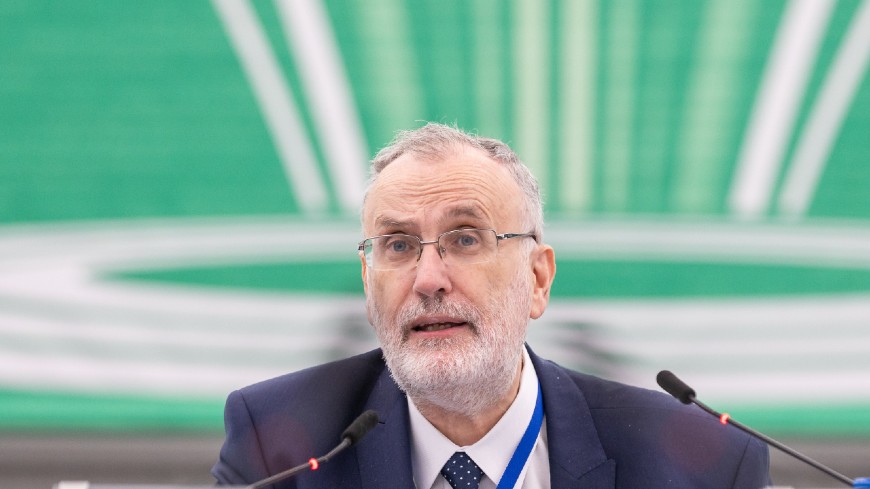
The President of the Congress of Local and Regional Authorities of the Council of Europe, Marc Cools, has made the following statement:
“Ten years ago, on 16 March 2014, the illegal referendum in the Ukrainian region of Crimea, organised at Russian gunpoint, set off a spiral of violence leading to Crimea’s illegal annexation by Russia two days later and eventually to the Russian Federation’s full-scale war of aggression against Ukraine through which we are living today.”
“In 2014, the Congress strongly condemned the annexation by the Russian Federation of the Autonomous Republic of Crimea and the city of Sevastopol. Today, we stand united with Ukraine and reaffirm our unwavering commitment to the independence, sovereignty and territorial integrity of Ukraine within its internationally recognised borders.”
- Diminuer la taille du texte
- Augmenter la taille du texte
- Imprimer la page
Congress Secretary General signs an MoU with UNECE
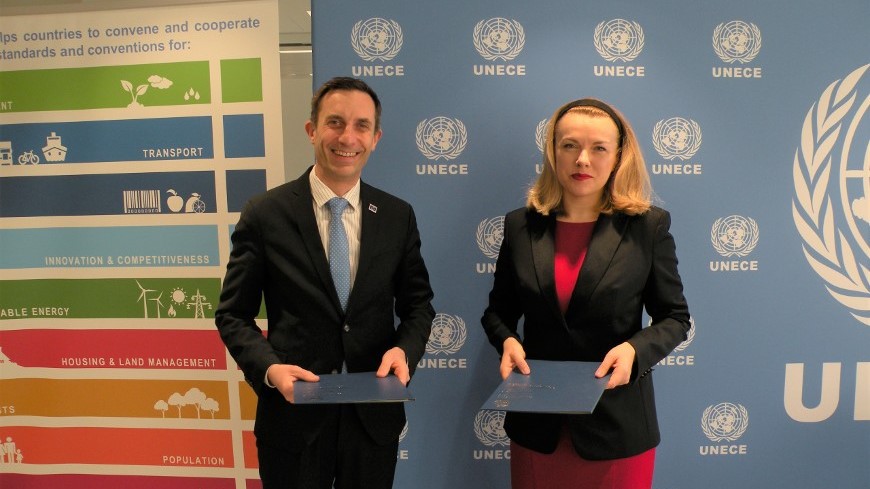
On 14 March 2024, Congress Secretary General Mathieu Mori signed a Memorandum of Understanding (MoU) between the Congress Secretariat and the United Nations Economic Commission for Europe (UNECE). This MoU builds upon an existing successful partnership and aims at strengthening the role of local and regional authorities in the implementation of the 2030 Agenda for Sustainable Development, strengthen multilevel governance, reduce societal inequalities and take action on local environmental issues.
Mathieu Mori took the opportunity to speak at the United Nations Regional Forum on Sustainable Development in Geneva. This forum brings together governments and stakeholders across the European region to discuss impactful and crisis-resilient policies to accelerate the implementation of the Sustainable Development Goals.
He stressed how local and regional authorities help deliver Goal 16 on Promoting just, peaceful and inclusive societies and presented the work of the Congress on promoting multi-level governance to ensure effective, accountable, and inclusive governance. Secretary General Mori stressed the importance of the European Charter of Local Self-Government as a Council of Europe key convention on promoting local self-governance and human rights and the role of the Congress in promoting and protecting its implementation in the 46 CoE Member States.
- Diminuer la taille du texte
- Augmenter la taille du texte
- Imprimer la page
Congress supports de-occupied and temporarily occupied communities of Ukraine
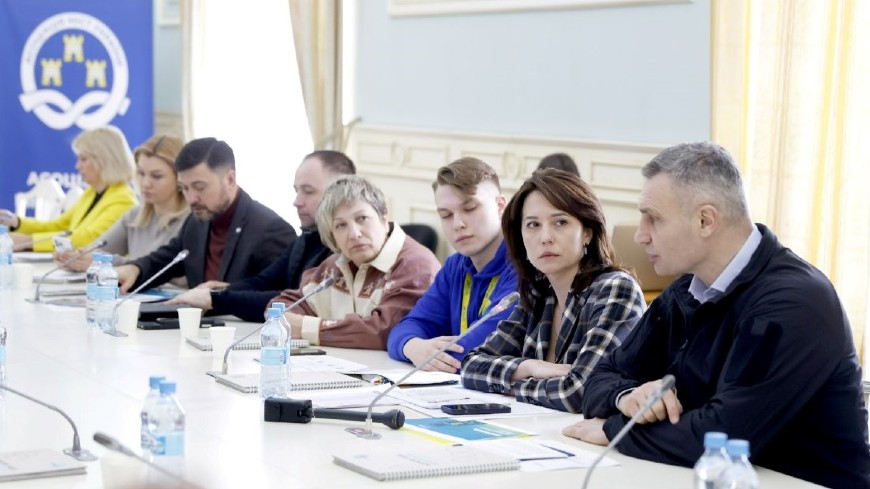
The newly established Committee for the development of de-occupied and temporarily occupied communities of the Association of Ukrainian Cities (AUC) held its first meeting in Kyiv, on 12-13 March 2024, with the participation of the Chair of the Congress Current Affairs Committee, Bryony Rudkin (United Kingdom, SOC/G/PD). She commended the resilience of Ukrainian local authorities and reiterated the Congress’ support in their future endeavours, stressing that “the severity and complexity of the needs call for strong multilevel governance and for the involvement of all stakeholders at the local level, to restore and deliver much needed services for all residents”.
Attended by mayors and local officials of about 60 communities from 9 regions, as well as representatives of the Parliament and the Government of Ukraine, the meeting served as a platform to address pressing issues faced by the country’s de-occupied and temporarily occupied communities – such as housing, access to employment, and education.
The AUC Committee agreed on its terms of reference, with includes strengthening intermunicipal cooperation and continuing multilevel dialogue with representatives of the Parliament and of the Government.
The Congress of Local and Regional Authorities works closely with local authorities all over Ukraine and with the Association of Ukrainian Cities as part of the project “Strengthening multi-level governance, democracy and human rights at local level in Ukraine” implemented within the Council of Europe Action Plan for Ukraine “Resilience, Recovery and Reconstruction” for 2023-2026. The project aims to strengthen the dialogue, partnership and consultation between different levels of government; enhance collaborative governance and citizen participation in line with the principles of local democracy and open government; and promote and guarantee the right to equality and non-discrimination at local level, for the recovery and reconstruction of Ukraine.
- Diminuer la taille du texte
- Augmenter la taille du texte
- Imprimer la page
Congress President condemns plans for Russian presidential elections in occupied Ukrainian regions
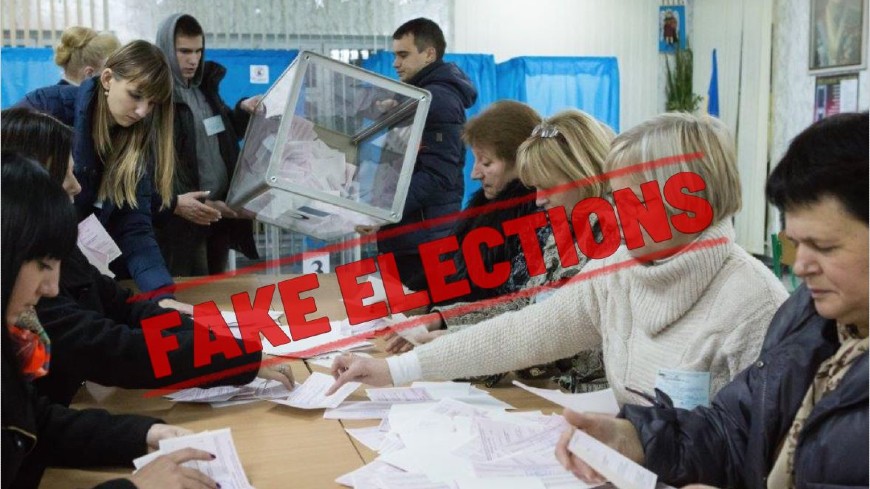
The President of the Congress of Local and Regional Authorities of the Council of Europe, Marc Cools, has made the following statement:
“I strongly condemn the plans by the Russian Federation to organise presidential elections in the temporarily occupied regions of Ukraine.”
“The illegal conduct of such so-called elections and compelling the citizens of Ukraine to vote in them represents a gross violation of international law and the rights of citizens protected by the European Convention on Human Rights, and yet another attempt by the Russian Federation to legalise the temporary occupation and annexation of Ukrainian territories.”
These plans have also been condemned by the Congress Bureau in its Declaration on the second anniversary of the Russian Federation’s war against Ukraine, which will be debated during the 46th Congress session in Strasbourg, 26-28 March 2024.
“These so-called elections coincide with ten years since the annexation by the Russian Federation of the Autonomous Republic of Crimea and the city of Sevastopol in 2014, which the Congress strongly condemned.”
“I reiterate that we stand united with Ukraine and the Ukrainian people at this decisive time.”
- Diminuer la taille du texte
- Augmenter la taille du texte
- Imprimer la page
Grants to Armenian municipalities hosting refugees: Call for projects
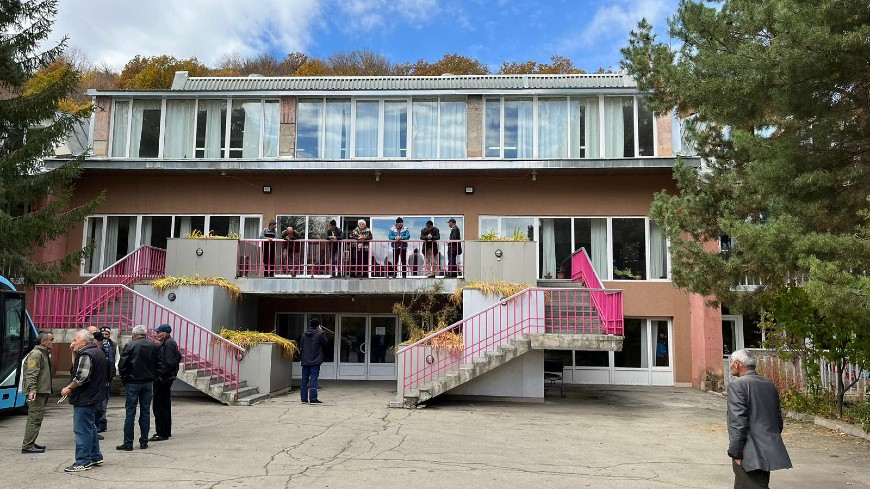
Karabakh Armenians at a shelter in the city of Aghavnadzor in the Kotayk province of Armenia
The Congress of Local and Regional Authorities, in line with its commitment to support Karabakh Armenians and its “readiness to assist, using all statutory, cooperation and political tools at its disposal” (Declaration 7 (2023) has launched a grant scheme in support of municipalities hosting refugees from Karabakh in Armenia.
Through a project implemented by the Centre of Expertise for Good Governance in the context of the Council of Europe Action Plan for Armenia 2023-2026, Armenian local authorities can apply for grants to implement projects that help build resilience and respond to their urgent and mid-term needs in support of refugees, ensuring protection of their human rights and overcoming challenges related to education, shelter and housing, social services, employment and integration.
The deadline for submission of applications is 12 April 2024. More details on the call can be found on the webpage of the Council of Europe Office in Yerevan.
- Diminuer la taille du texte
- Augmenter la taille du texte
- Imprimer la page
Strengthening municipal capacities in Bulgaria
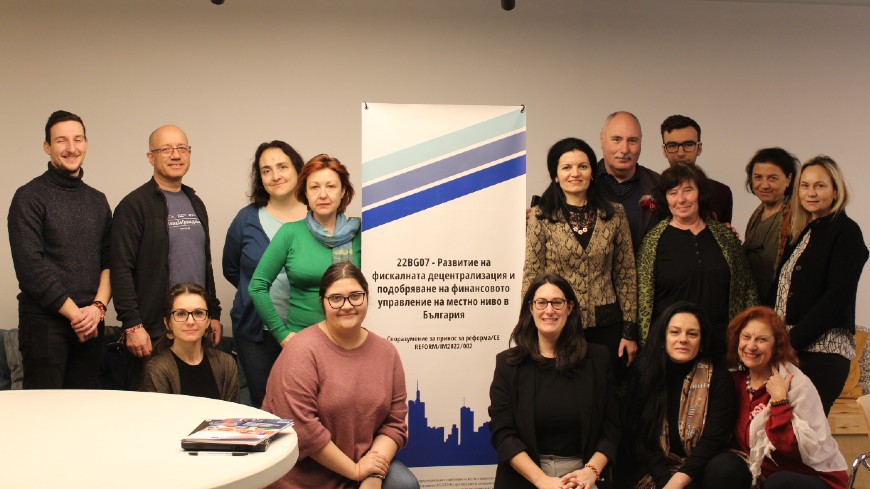
“We need good governance: without good governance, fiscal decentralisation is meaningless”, stated a representative from the Bulgarian Ministry of Regional Development and Public Works, setting the tone for discussion of the results of a Training Needs Analysis (TNA) of local authorities in that country, at a workshop held in Sofia on 29 February 2024.
The TNA, carried out by the Centre of Expertise for Good Governance (CEGG) at the Congress of Local and Regional Authorities of the Council of Europe under the joint EU/CoE project “Developing fiscal decentralisation and improving local financial management in Bulgaria, was presented to stakeholders from national training entities, associations of local authorities, central government and civil society.
The outcomes of the TNA underscored the imperative for Bulgaria to craft a National Training Strategy for local government, and consider establishing a dedicated agency to oversee its implementation and help strengthen the institutional capacities of local authorities in line with #SDG16.
Following the workshop, the CEGG trained 15 participants on Participatory budgeting, as a potent instrument aligning to several of the 12 principles of Good Governance.
The activities were organised with the support of the project grantees, the Foundation for Local Government Reform and the Citizen Participation Forum.
- Diminuer la taille du texte
- Augmenter la taille du texte
- Imprimer la page
Congress supports multi-level governance on migration management in the Republic of Moldova
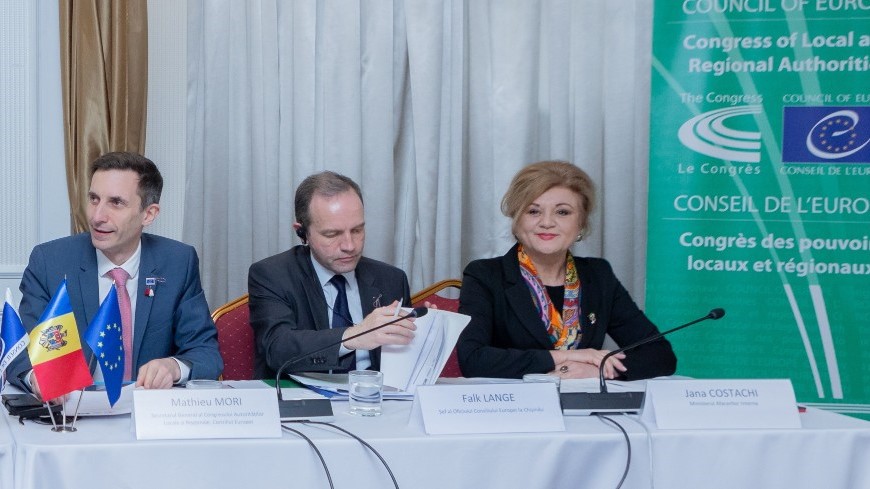
Migration-related challenges and the development of comprehensive integration solutions were discussed at a roundtable on “Building resilience at local level through migration management and inclusion” organised by the Congress of Local and Regional Authorities in Chisinau, on 5 March 2024. The event provided a platform for reflection for 100 representatives of the government, the Parliament, local authorities, the Ombudsperson and civil society. They outlined the importance of multilevel co-operation for effective migration management that upholds the human rights of all residents, including migrants and refugees.
The Secretary General of the Congress, Mathieu Mori, highlighted the key role of local authorities in migration management, and the importance of building synergies across public institutions, with relevant stakeholders and between countries. He reiterated the Congress support to authorities at all levels in developing sustainable, human-rights centred and democratic solutions.
Participants were joined by local elected representatives and experts from Poland and Romania who provided valuable insights on fostering multi-dimensional inclusion. They also discussed the conclusions of a country-specific baseline report conducted in the Republic of Moldova with Congress support.
On the occasion of the roundtable, the Congress Secretary General held meetings with with relevant stakeholders notably in view of the Congress contribution to the forthcoming Council of Europe Action Plan for the Republic of Moldova. He met representatives of the State Chancellery, the Ministry of Foreign Affairs, the Parliament, CALM, the Ombudsperson, civil society, as well as members of the international community. These stakeholders shared their commitment to pursue multi-level governance in the country and agreed that a consolidated institutionalised dialogue between central and local authorities will also reinforce the country’s efforts to fulfil its obligations as a Council of Europe member State and as part of the EU accession process.
The event was organised by the Congress as part of two co-operation projects “Reinforcing the culture of dialogue and ethical open local governance in the Republic of Moldova” and “Strengthening resilience in local and regional authorities facing migration challenges”; and in partnership with CALM within the framework of the quadripartite Memorandum of Understanding signed between the Congress and the national associations of local authorities from Poland, the Republic of Moldova and Romania.
- Diminuer la taille du texte
- Augmenter la taille du texte
- Imprimer la page
More women in politics, a shared battle
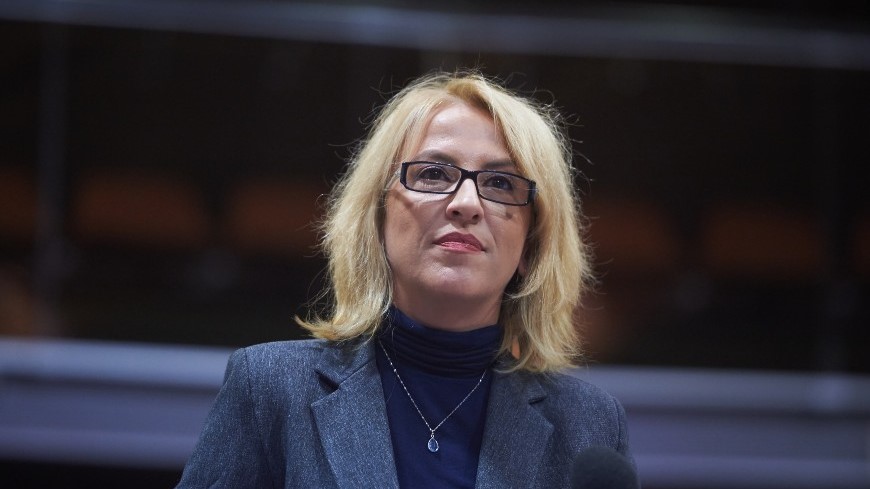
On the occasion of International Women’s Day 2024, 8 March, Congress Thematic Spokesperson on Gender Equality Eirini Dourou (Greece, SOC/G/PD) made the following statement:
“On this year’s International Women’s Day, we echo the words of the Reykjavik Principles for Democracy and call for full, equal and meaningful participation in political and public life for all, in particular for women and girls. We cannot “inspire inclusion” if women and girls are not fully represented in our democratic institutions. This is a shared battle to be embraced by all.
As local and regional authorities, we have a key role to play in accelerating women’s political careers. Helping them to develop their capacities and bolster their representation and visibility at regional and national level is a sure way to see their numbers increase in our parliaments and governments.
Young women in particular should be given the opportunity and the support to stand for local office, as they are still the least represented amongst political leadership. As locally and regionally elected representatives having paved the way, we should now stand with young women, mentor them and encourage them to take up the space they deserve.
We all need to do better in order to ensure that higher rates of women in local politics do not need to be specially celebrated in the future, but rather become part of the norm.”
In 2020, the Congress adopted a report on “Fighting sexist violence against women in politics at local and regional level” and developed a guide on preventing and combatting sexism at local level in Ukraine, which has since been adapted to offer guidance for women and men in local politics in Georgia, Bosnia and Herzegovina as well as in Kosovo*.
International Women's Day 2024 campaign theme is 'Inspire Inclusion'
- Diminuer la taille du texte
- Augmenter la taille du texte
- Imprimer la page
Citizens' Assemblies in Banja Luka and Mostar spark local innovation
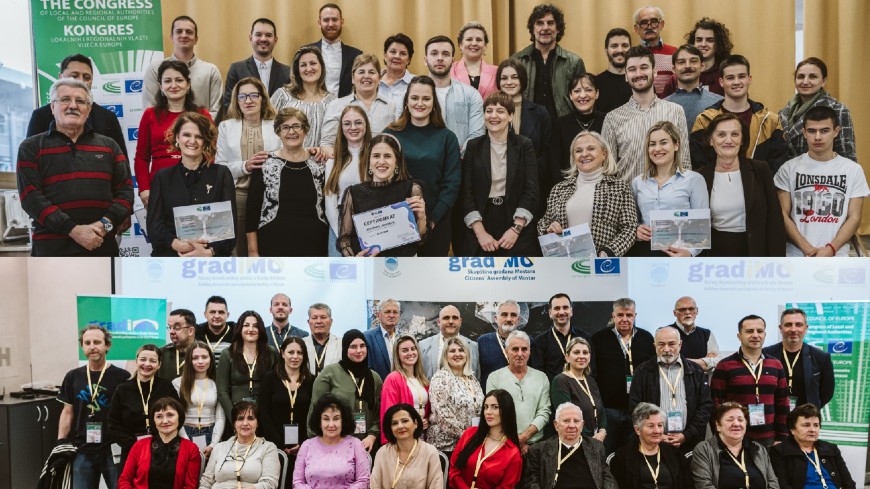
Citizens’ Assemblies in Banja Luka and Mostar ended after three weekends of deliberations. They each provided a platform for joint policy development and co-creative decision-making between local authorities and citizens.
The Mostar Assembly focused on how to make the city a more attractive and long-term-stay destination for visitors, while in Banja Luka 35 citizens debated on how to support youth entrepreneurship in the city. Both produced a set of recommendations addressed to the respective local authorities.
The Congress will continue supporting the cities of Banja Luka and Mostar in the implementation of the recommendations produced by the Assemblies and the sustainability of such processes in Bosnia and Herzegovina.
These activities were organised in the framework of the project “Innovating democratic participation at local level in Bosnia and Herzegovina” implemented by the Congress of Local and Regional Authorities within the Council of Europe Action Plan for Bosnia and Herzegovina 2022-2025. The project aims to enhance the quality of local democracy and create opportunities for citizens to engage in innovative participatory processes in Bosnia and Herzegovina. It promotes new democratic approaches, open government, public ethics, transparent and inclusive local policy making in the country.
Website of Mostar Citizens’ Assembly
Website of Banja Luka Citizens’ Assembly
Recommendation : the City of Banja Luka
Recommendation : the City of Mostar
- Diminuer la taille du texte
- Augmenter la taille du texte
- Imprimer la page
Strengthening local finance in Hungary

The Hungarian National Association of Local Authorities (TÖOSZ) and the Council of Europe exchanged on key policies and practice with regard to local government finance. Organised by the Centre of Expertise for Good Governance at the Congress of Local and Regional Authorities of the Council of Europe, the project aims to strengthen good governance at all levels in line with the Reykjavik declaration and the relevant Council of Europe standards such as the Principles of Good Democratic Governance, adopted by the Council of Europe in 2023.
Local government associations and representatives from the Ministry of Public Administration and Territorial Development, Ministry of Finance, The Hungarian State Treasury and State Audit reviewed the findings of the recent Peer Review discussed the design of the new Local Government Data Platform (LGDP) and highlighted the shared priority of improving the quality of local data.
The ‘Local Government Public Finance Development and Municipal Capacity Building in Hungary’ project is co-funded by the European Commission’s DG REFORM via the Technical Support Instrument 2022 and by the Council of Europe, and implemented by the Centre of Expertise for Good Governance.
- Diminuer la taille du texte
- Augmenter la taille du texte
- Imprimer la page



